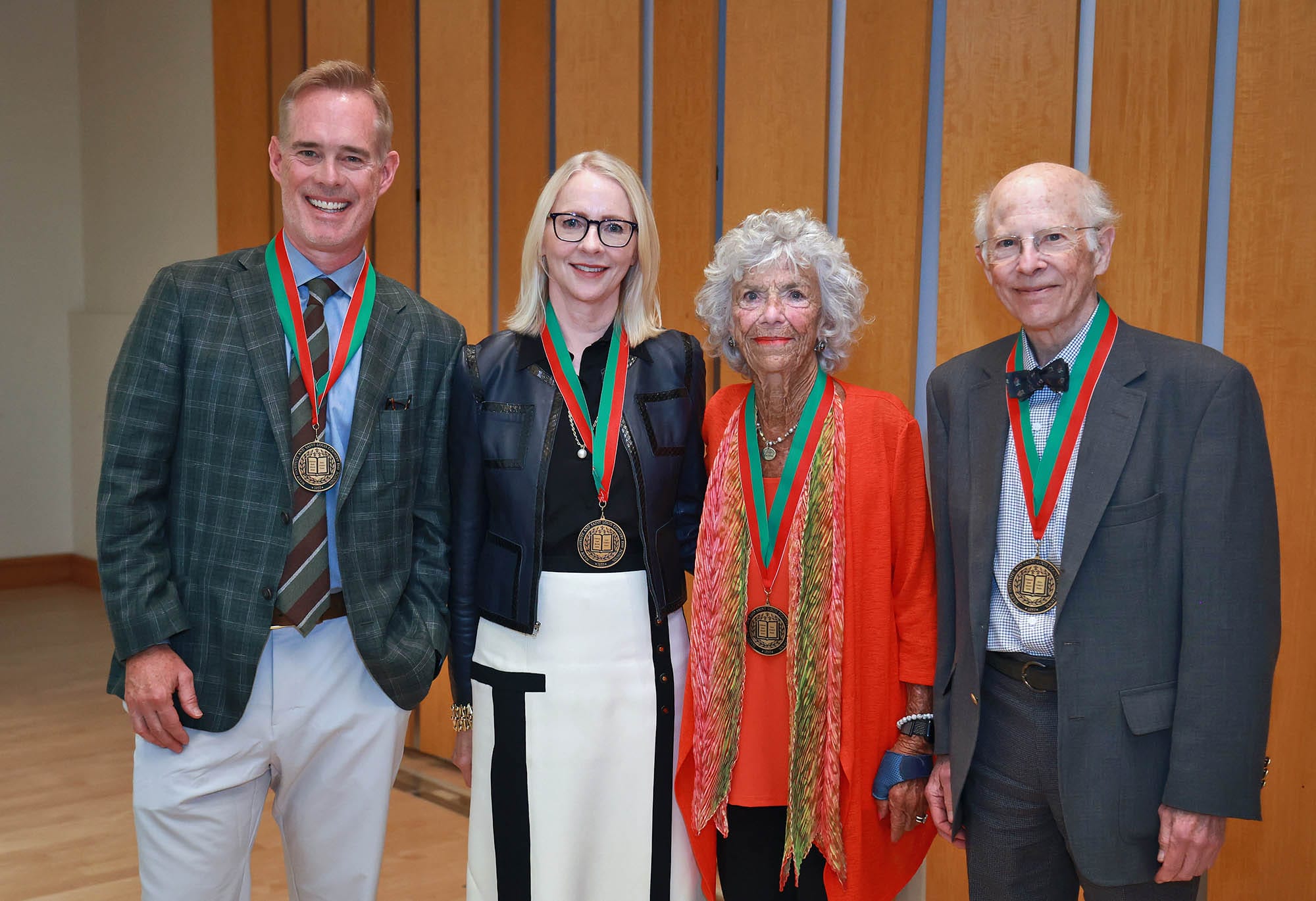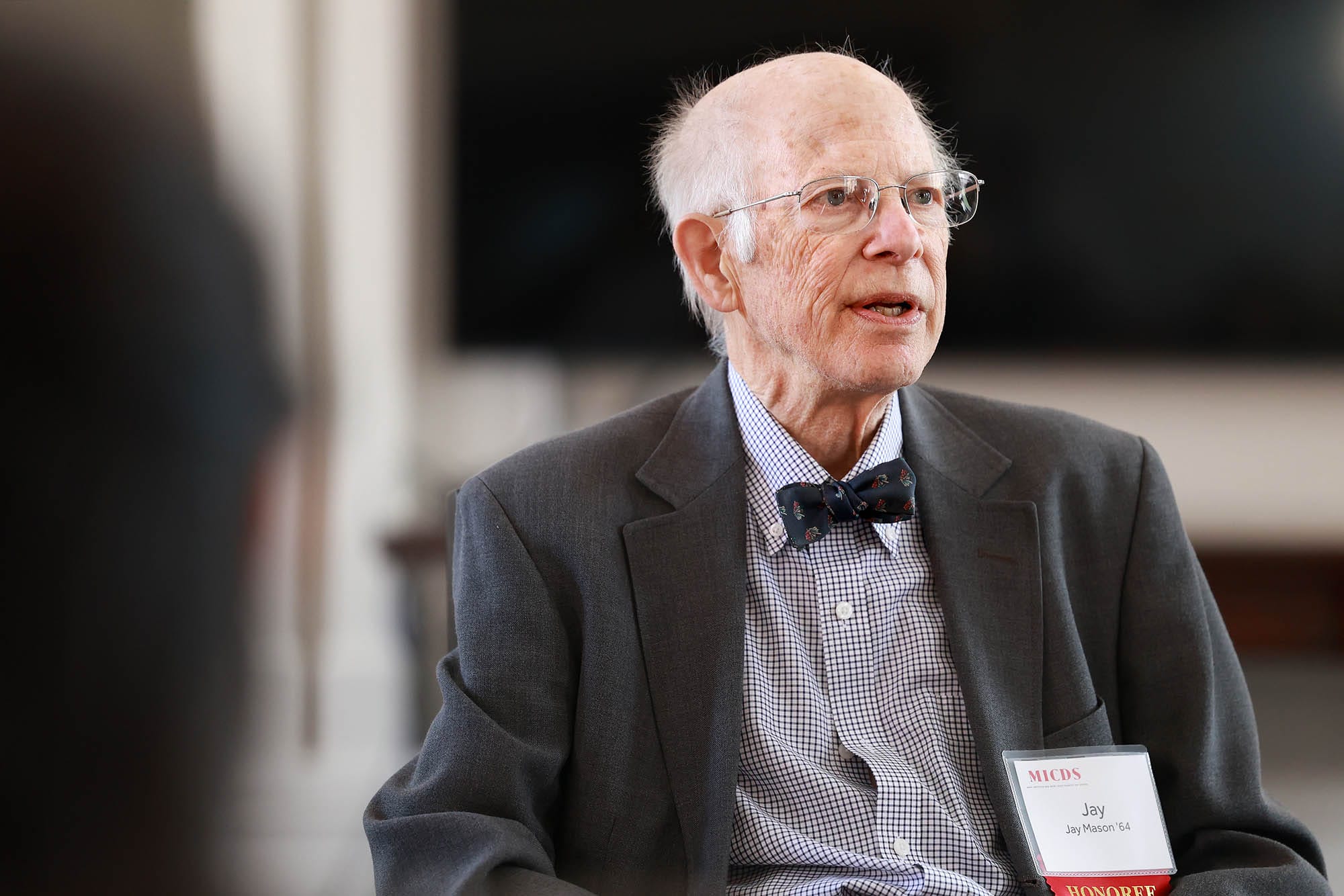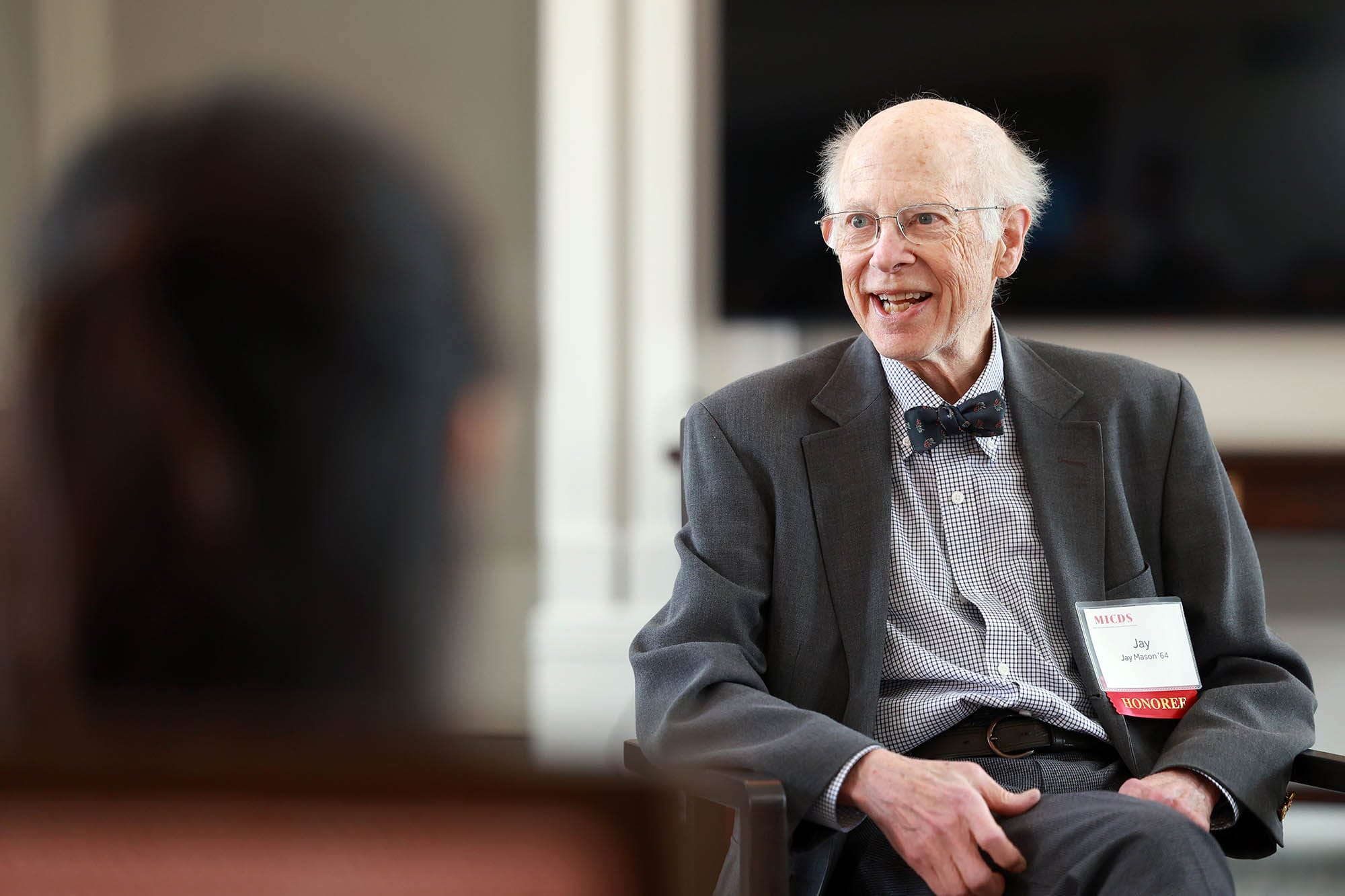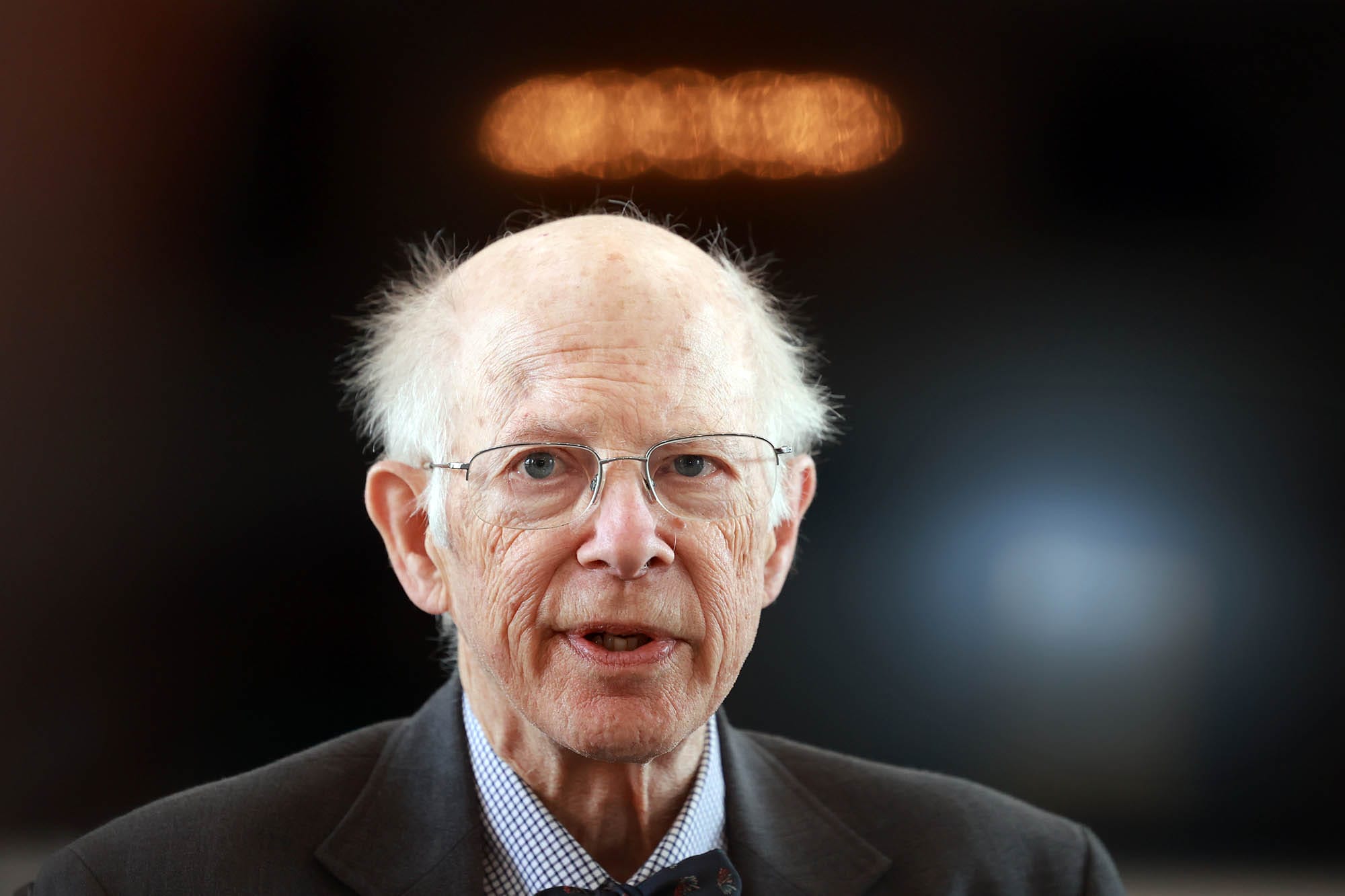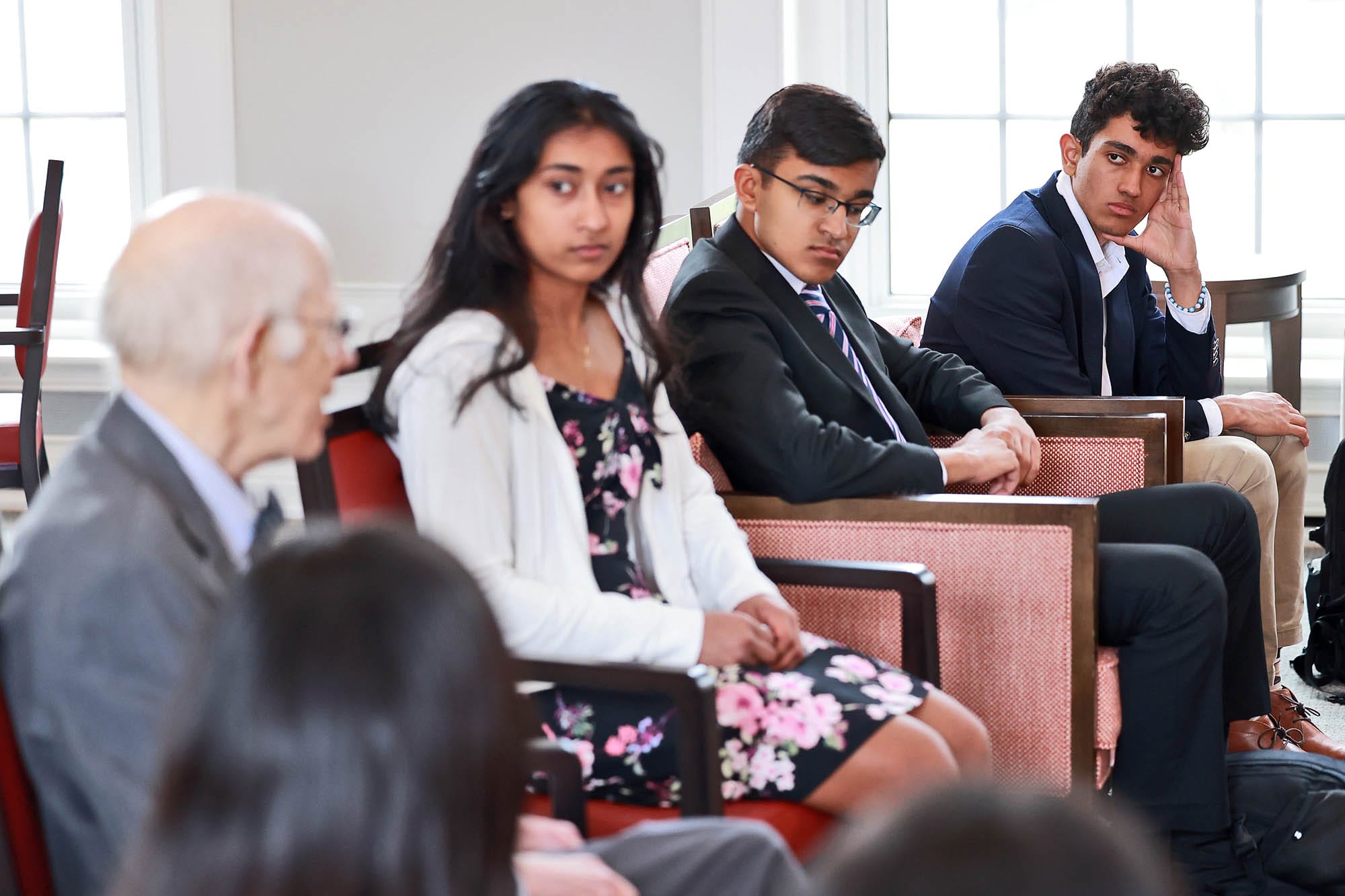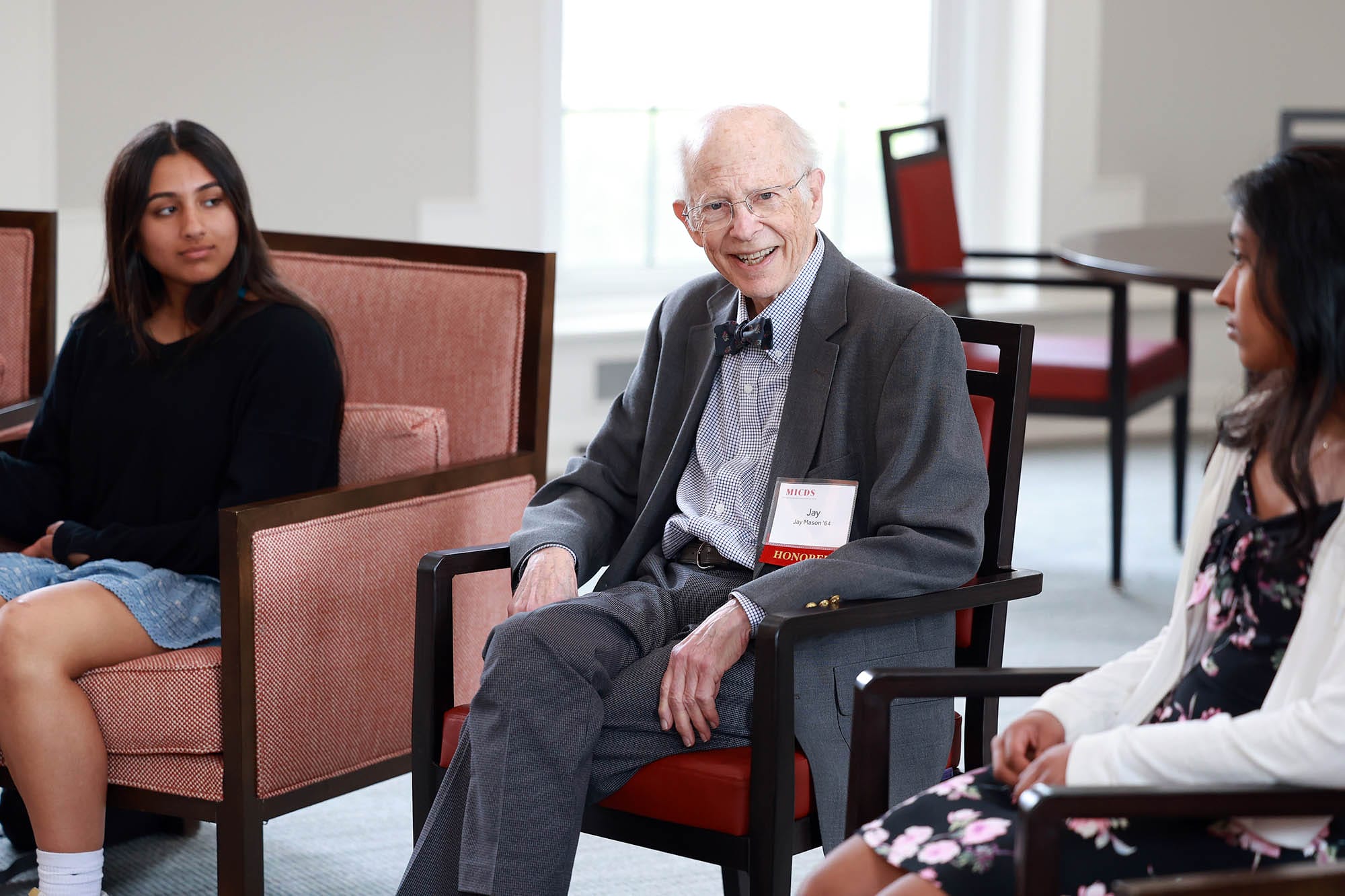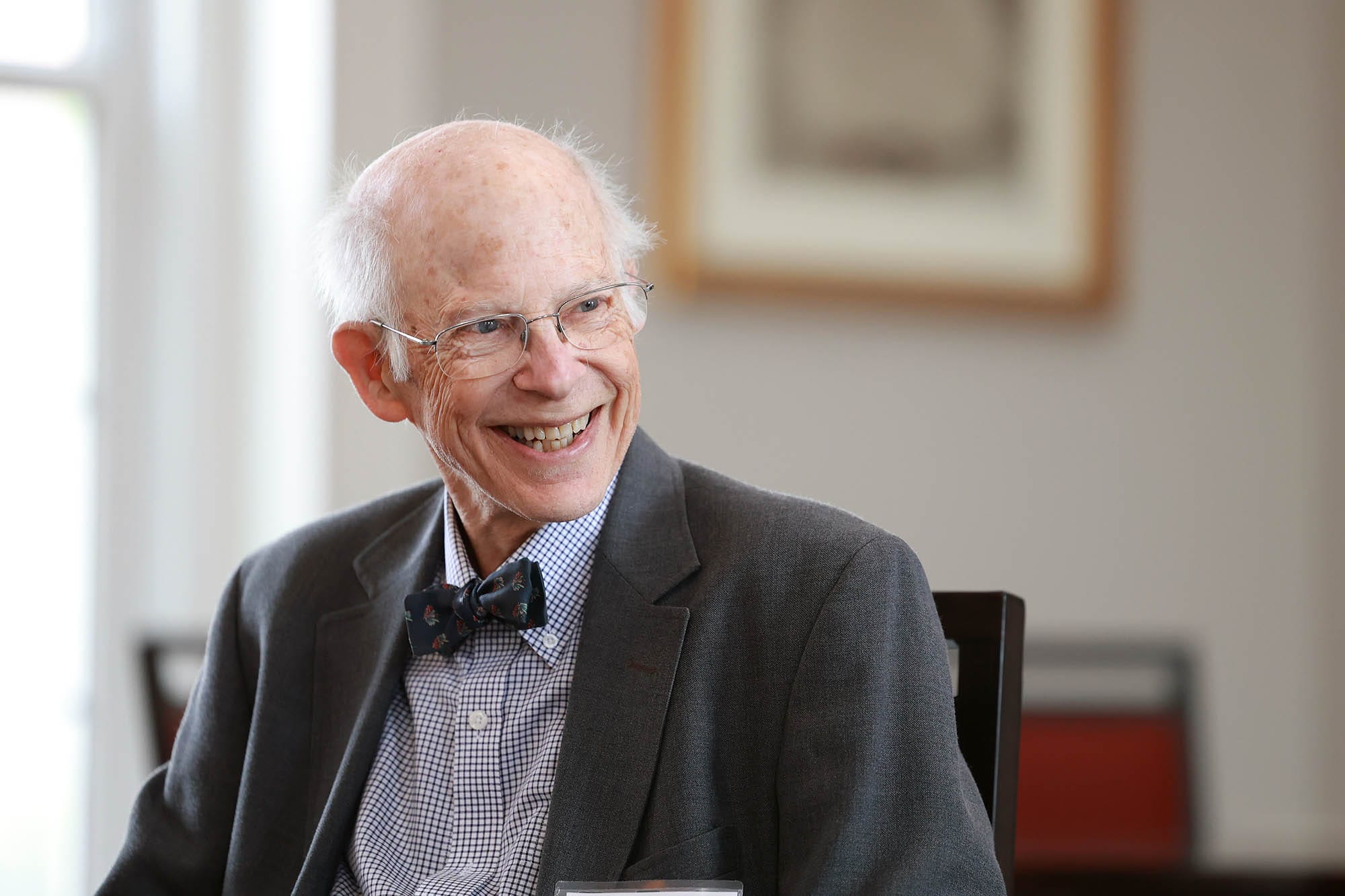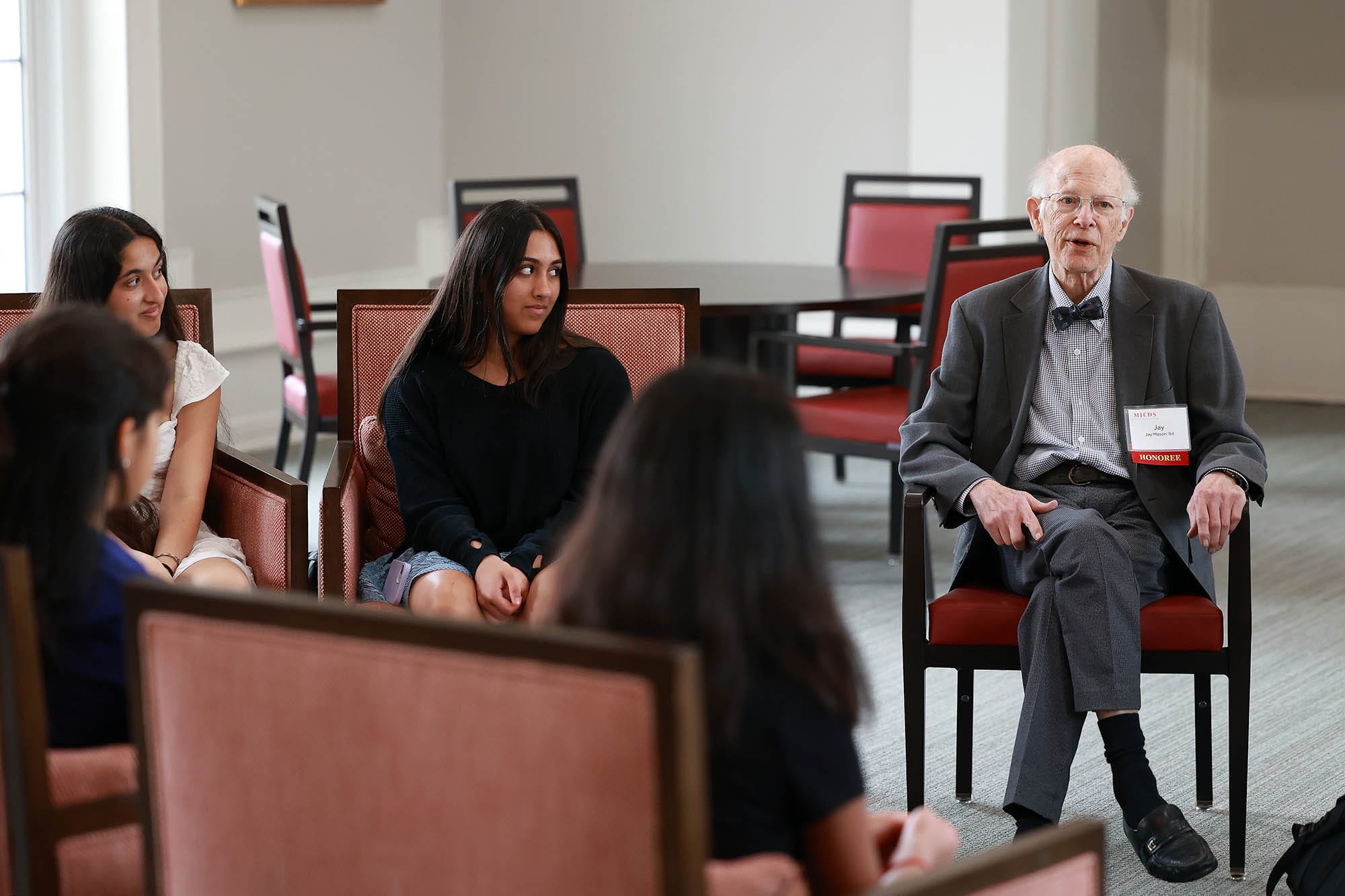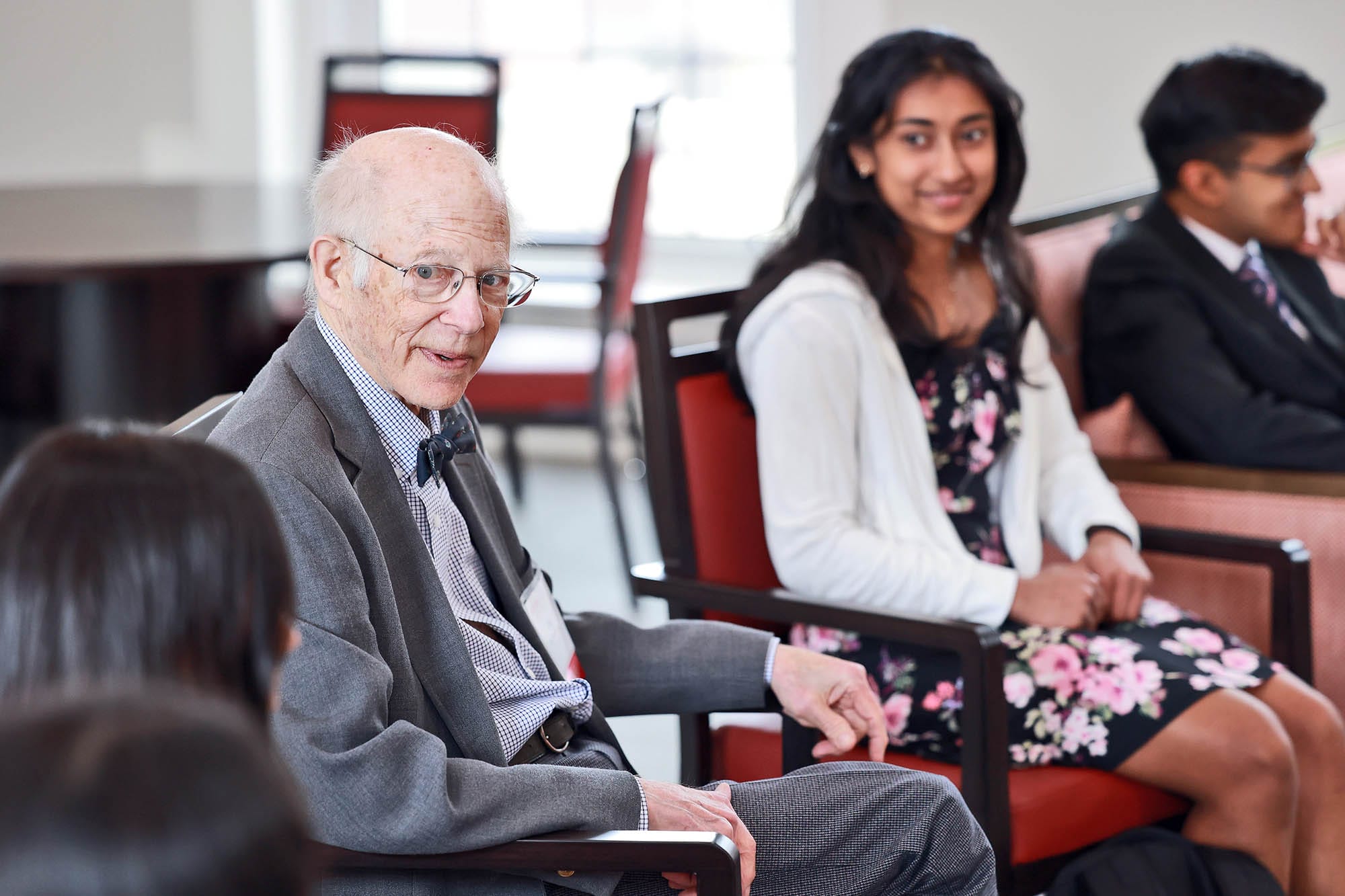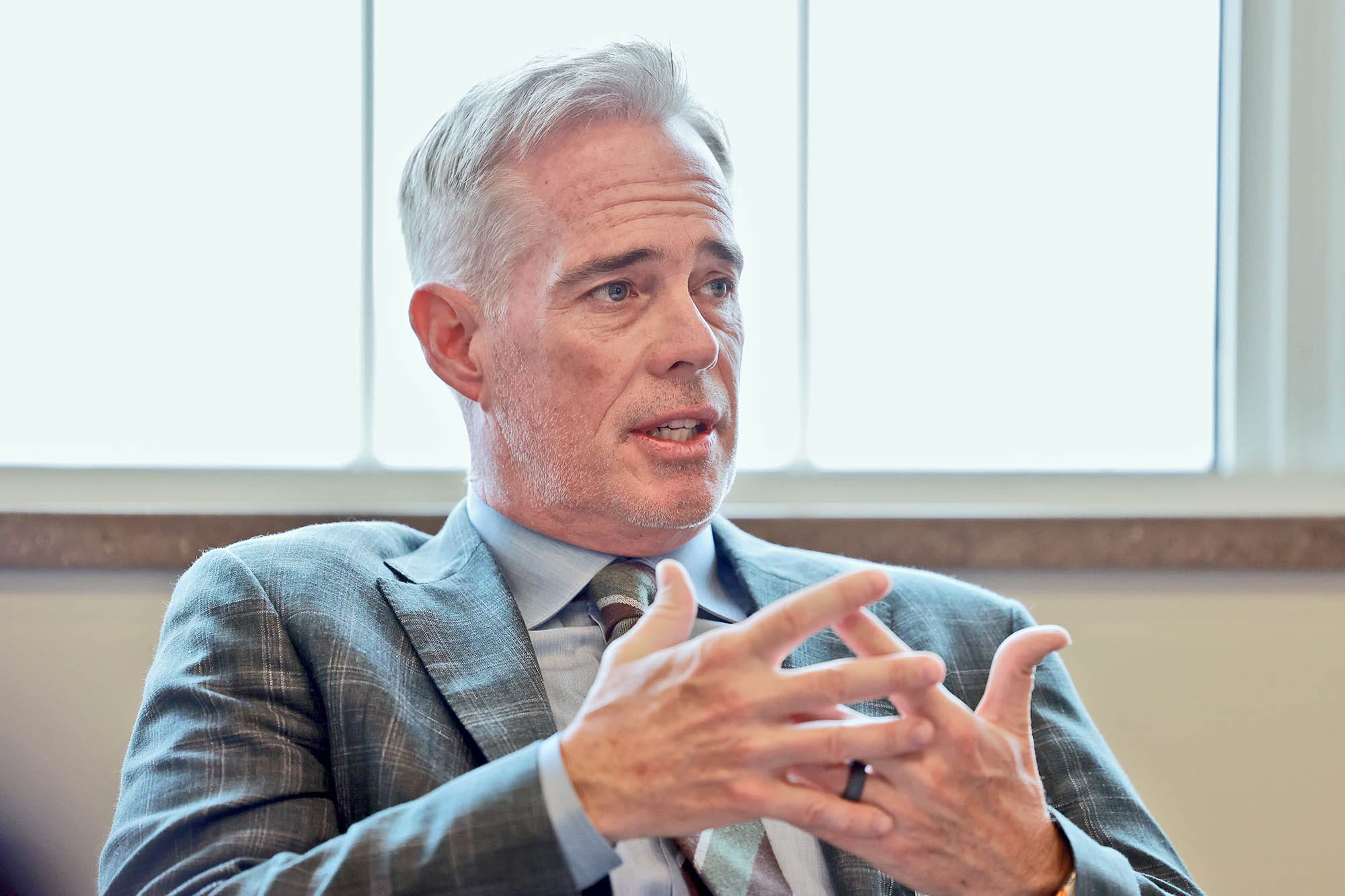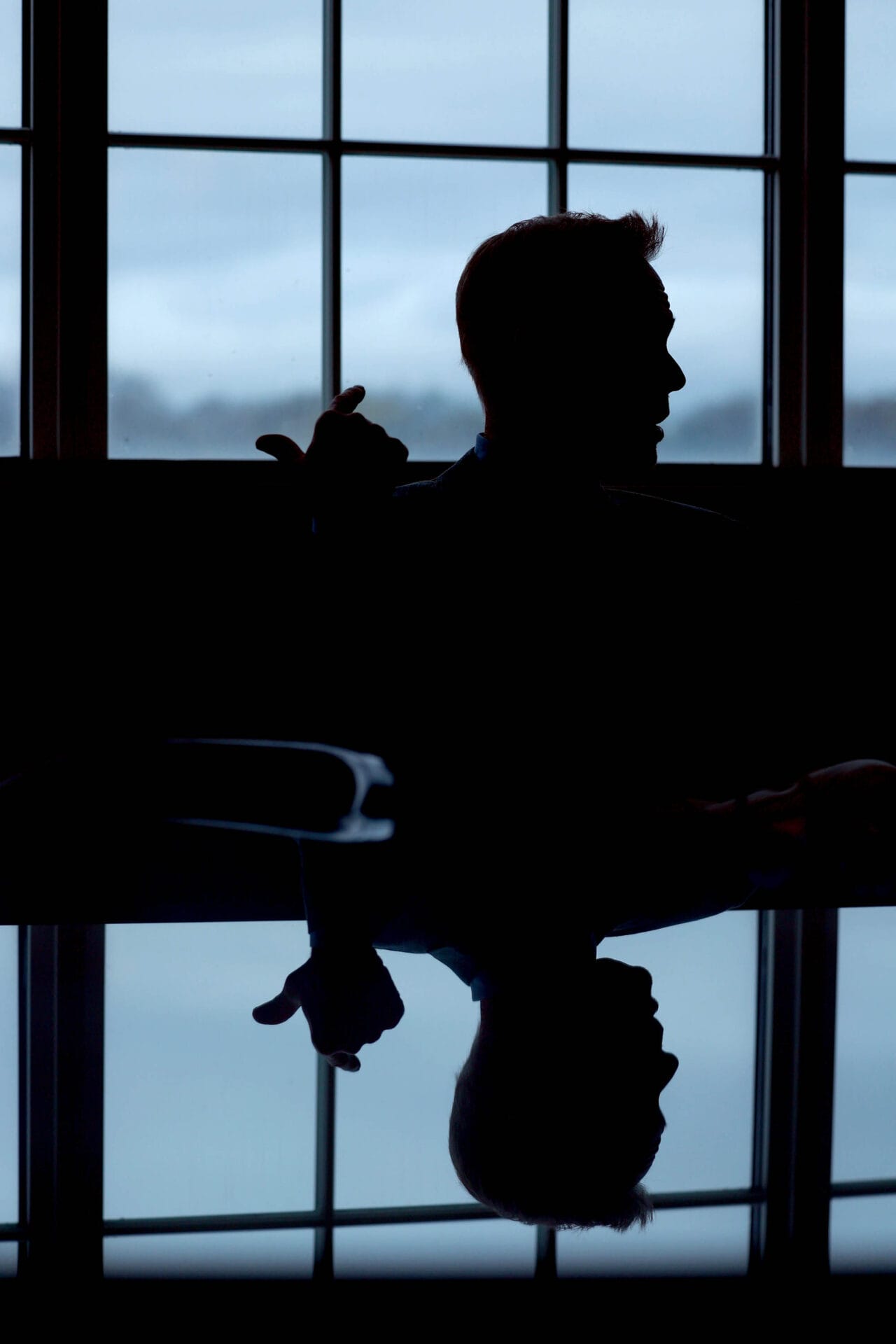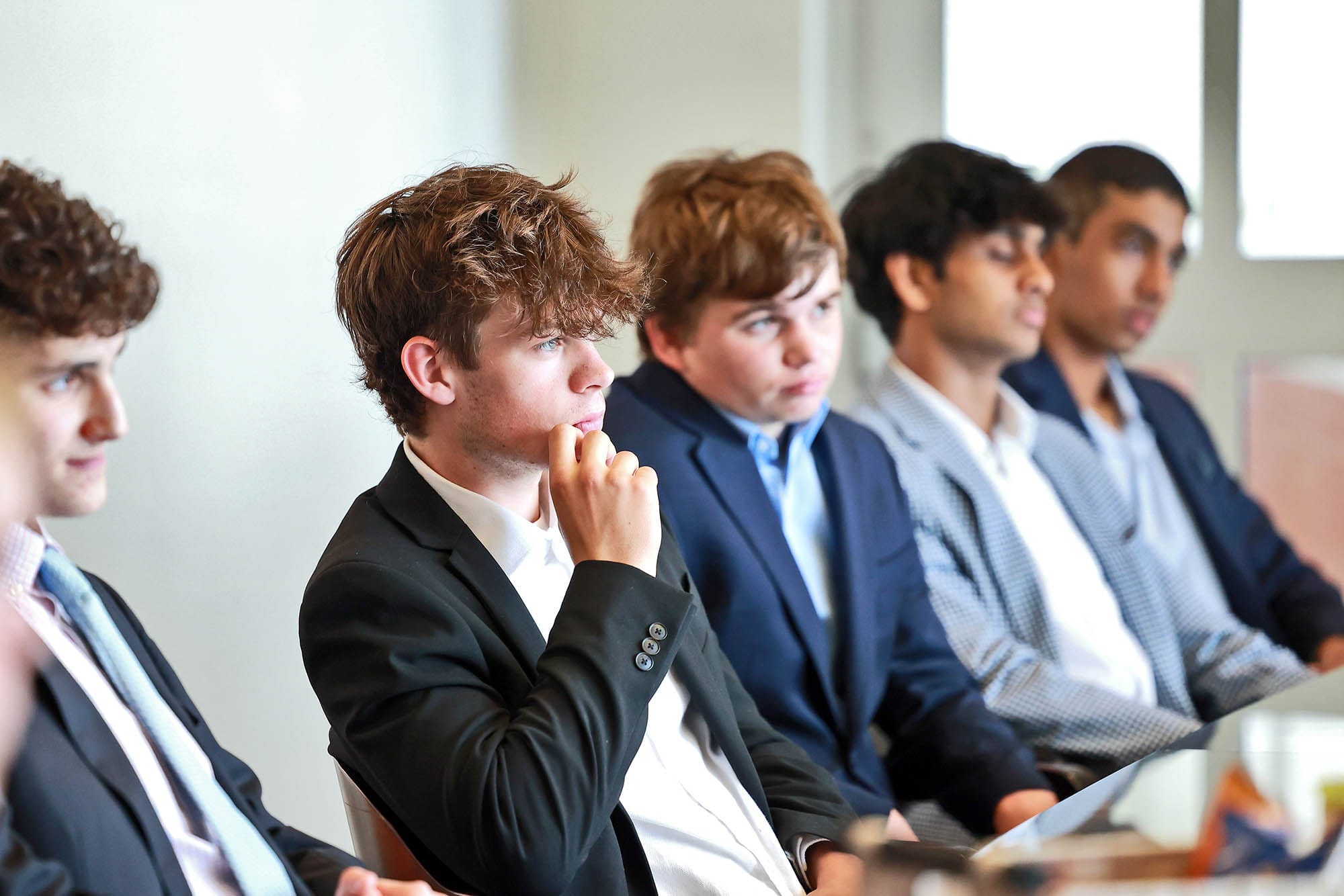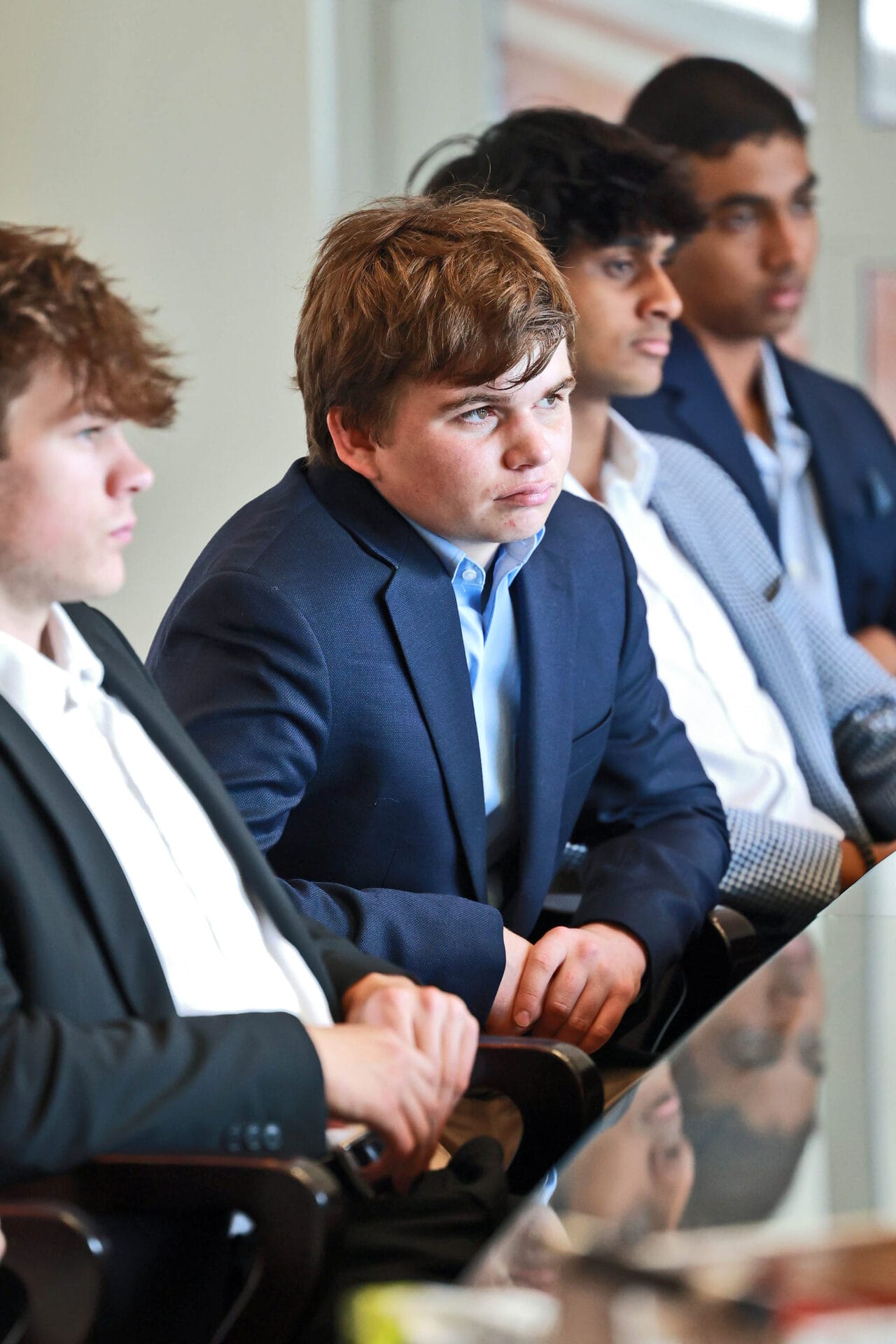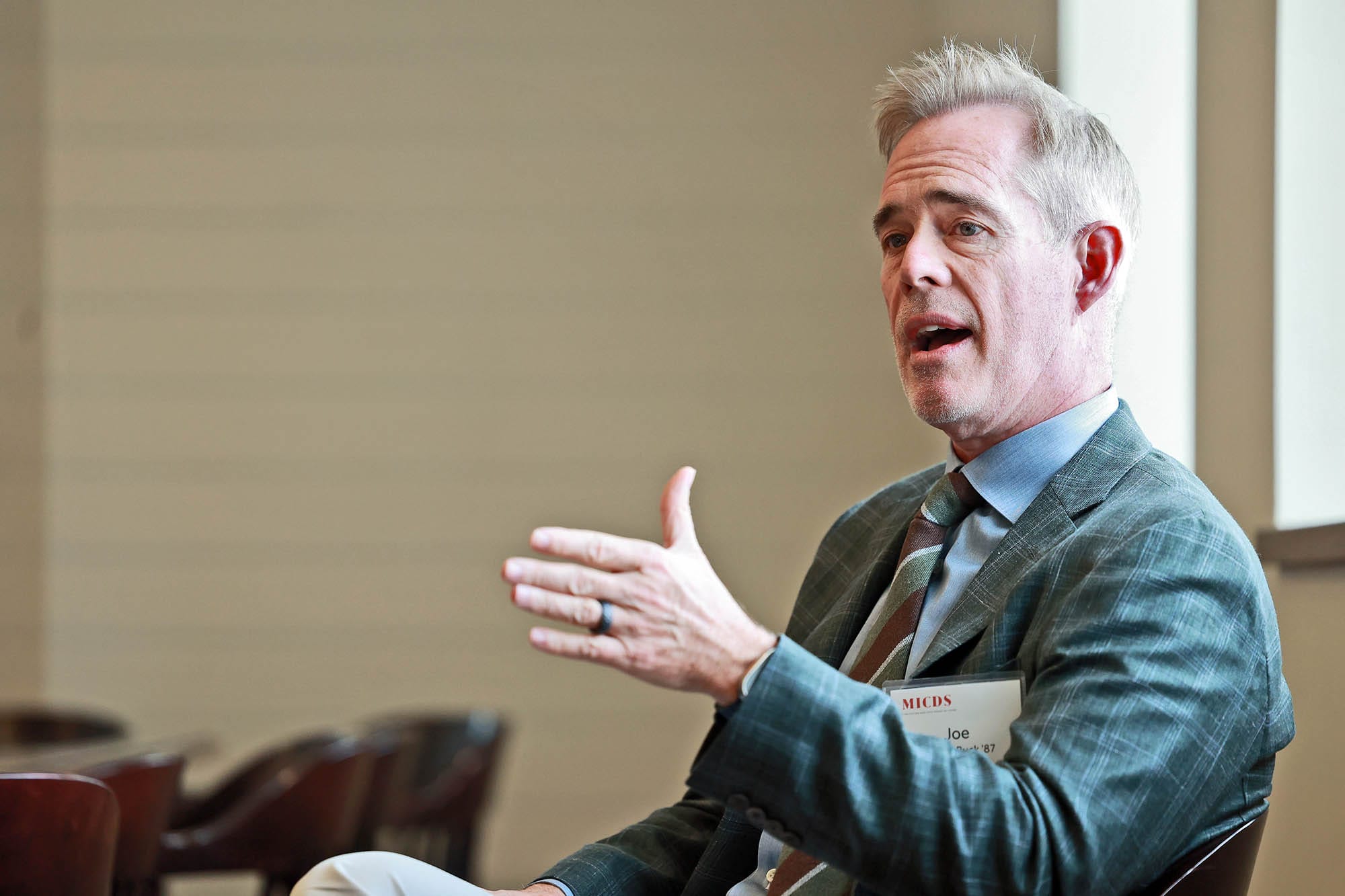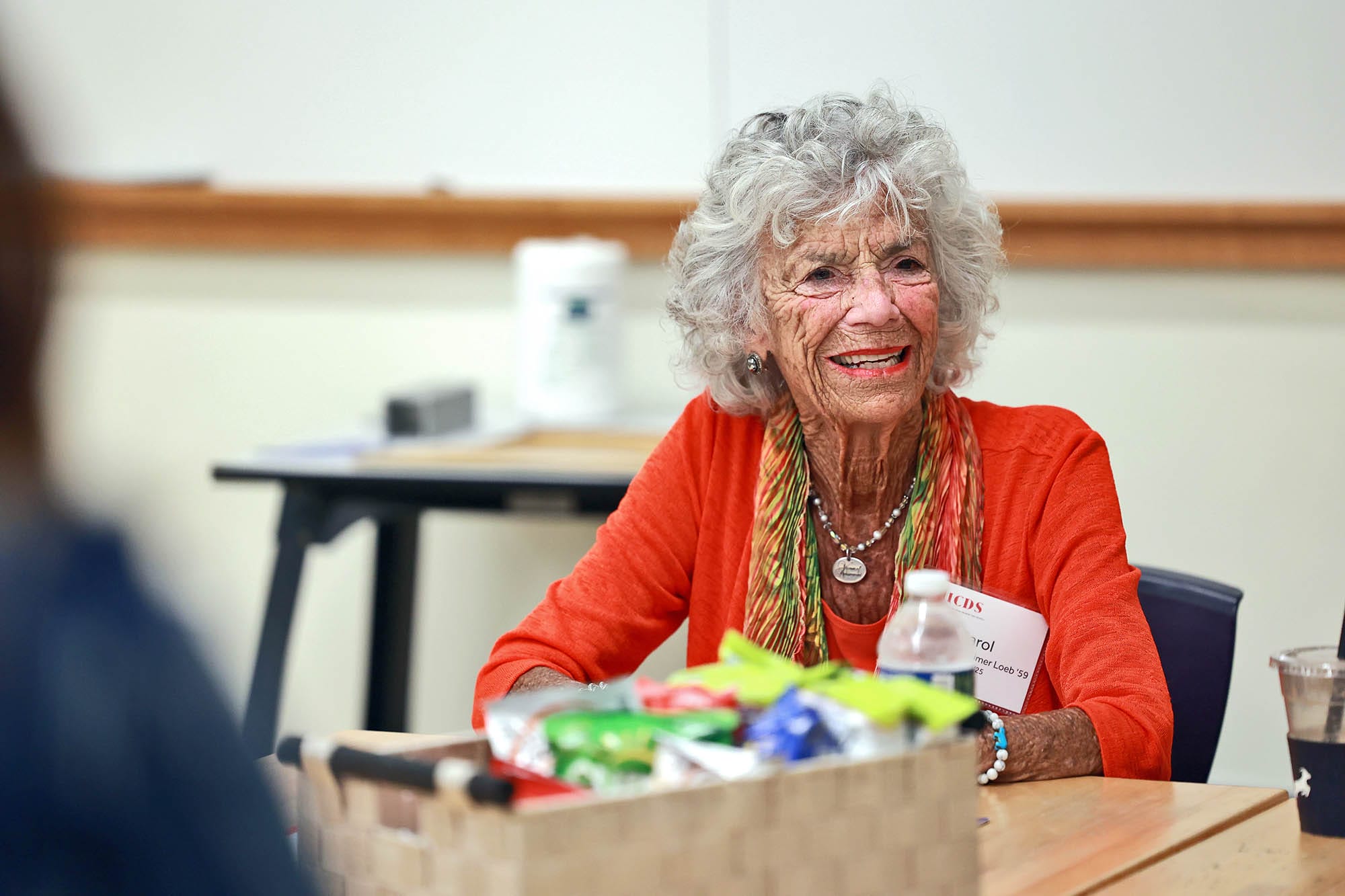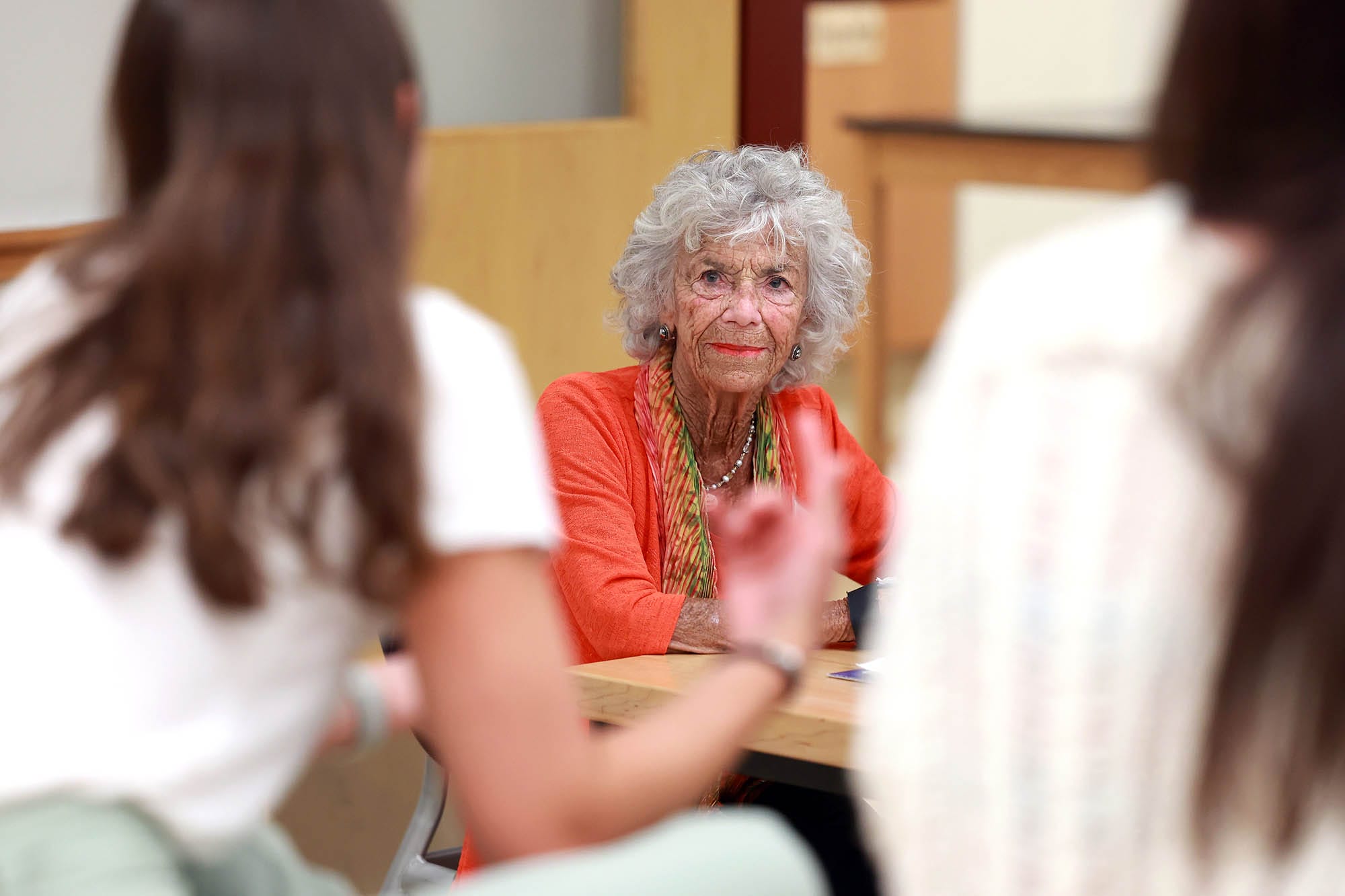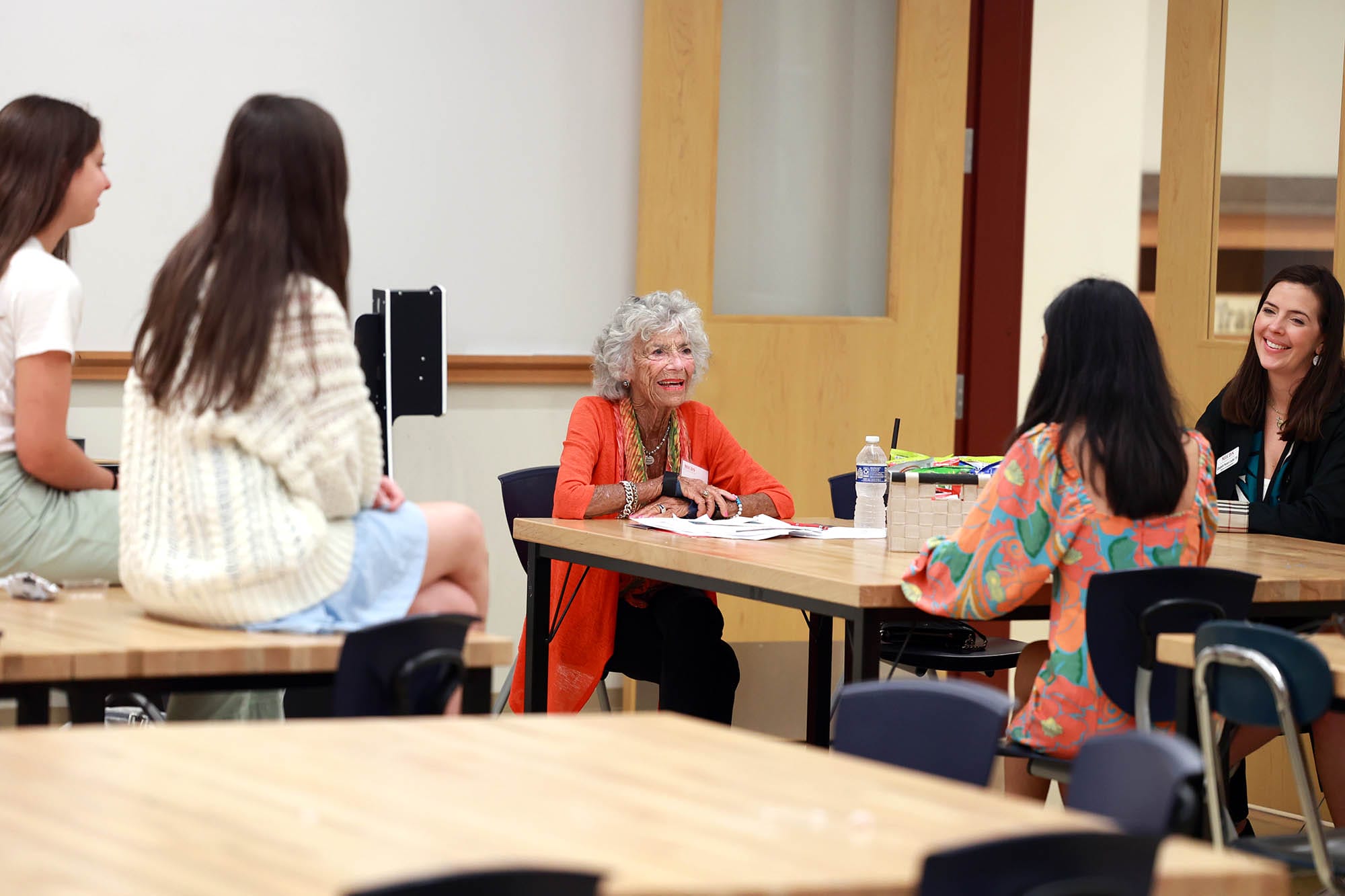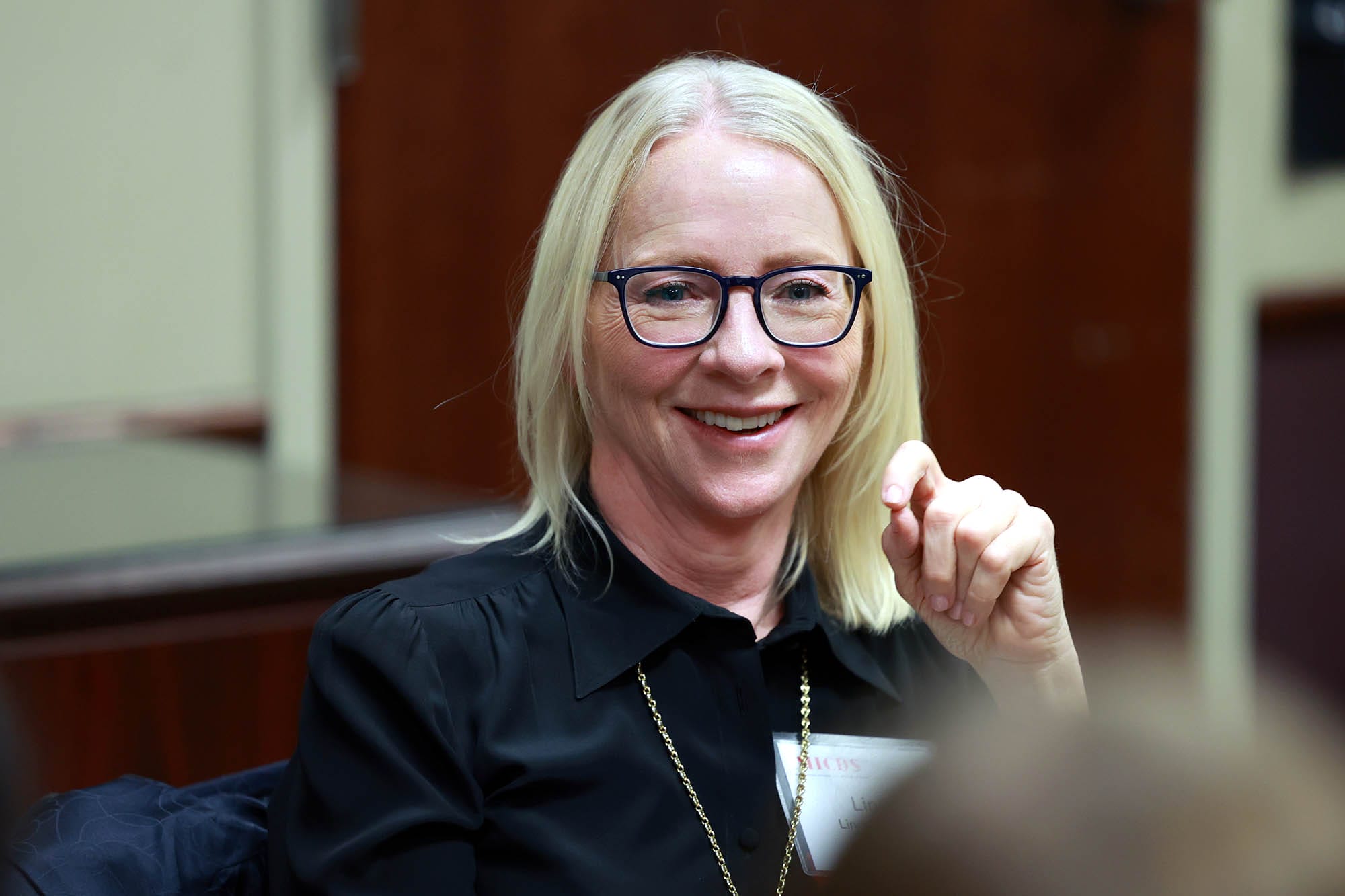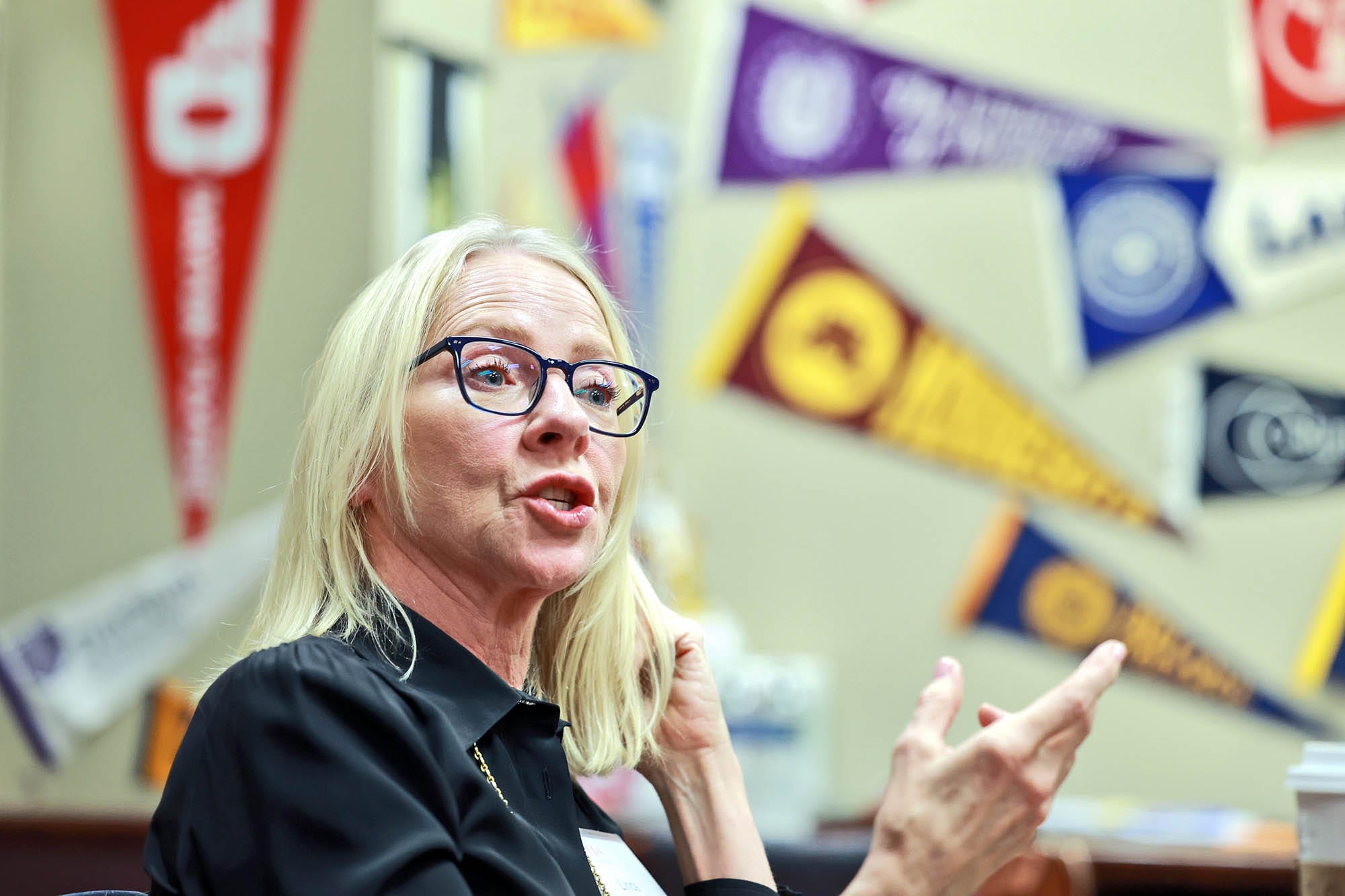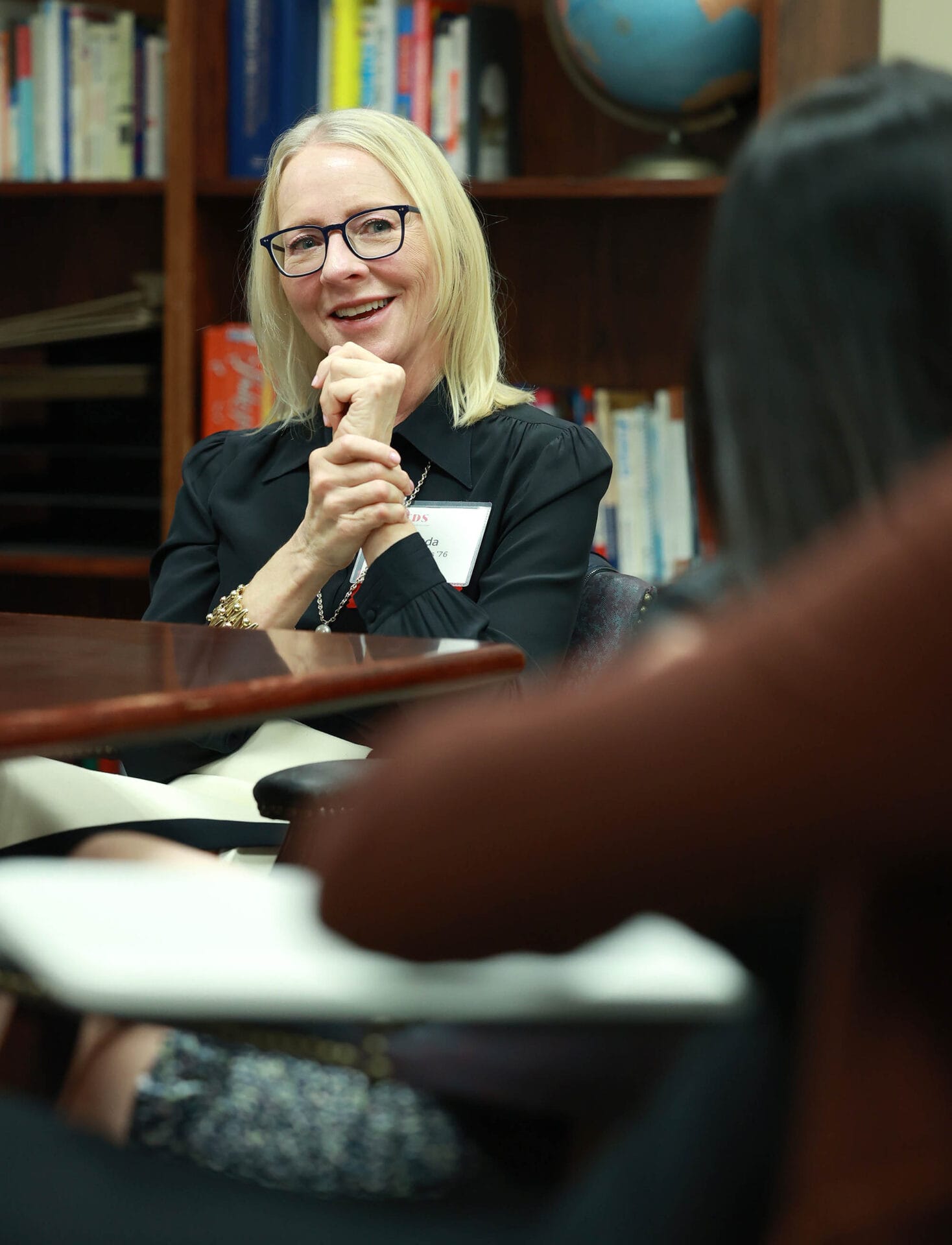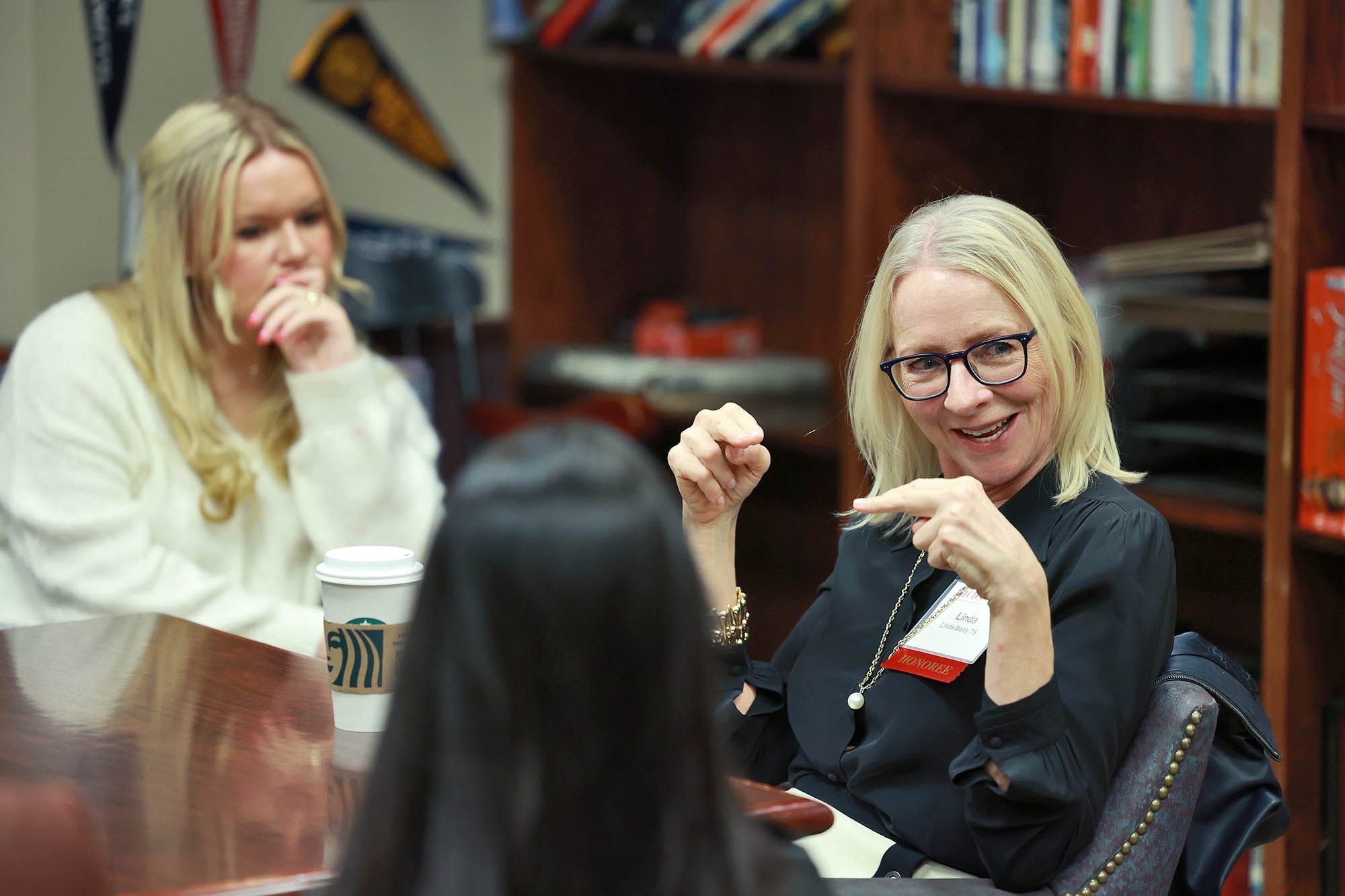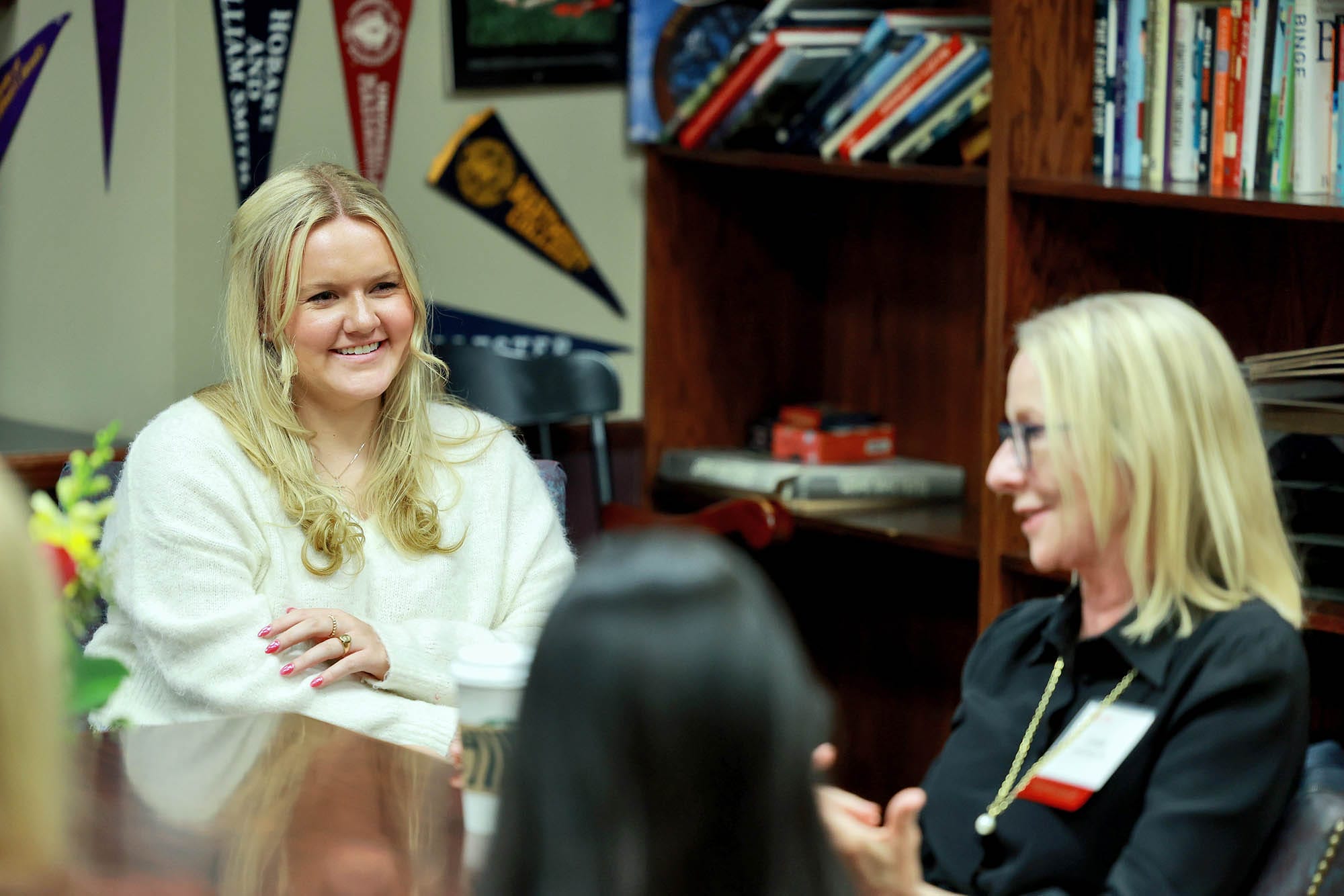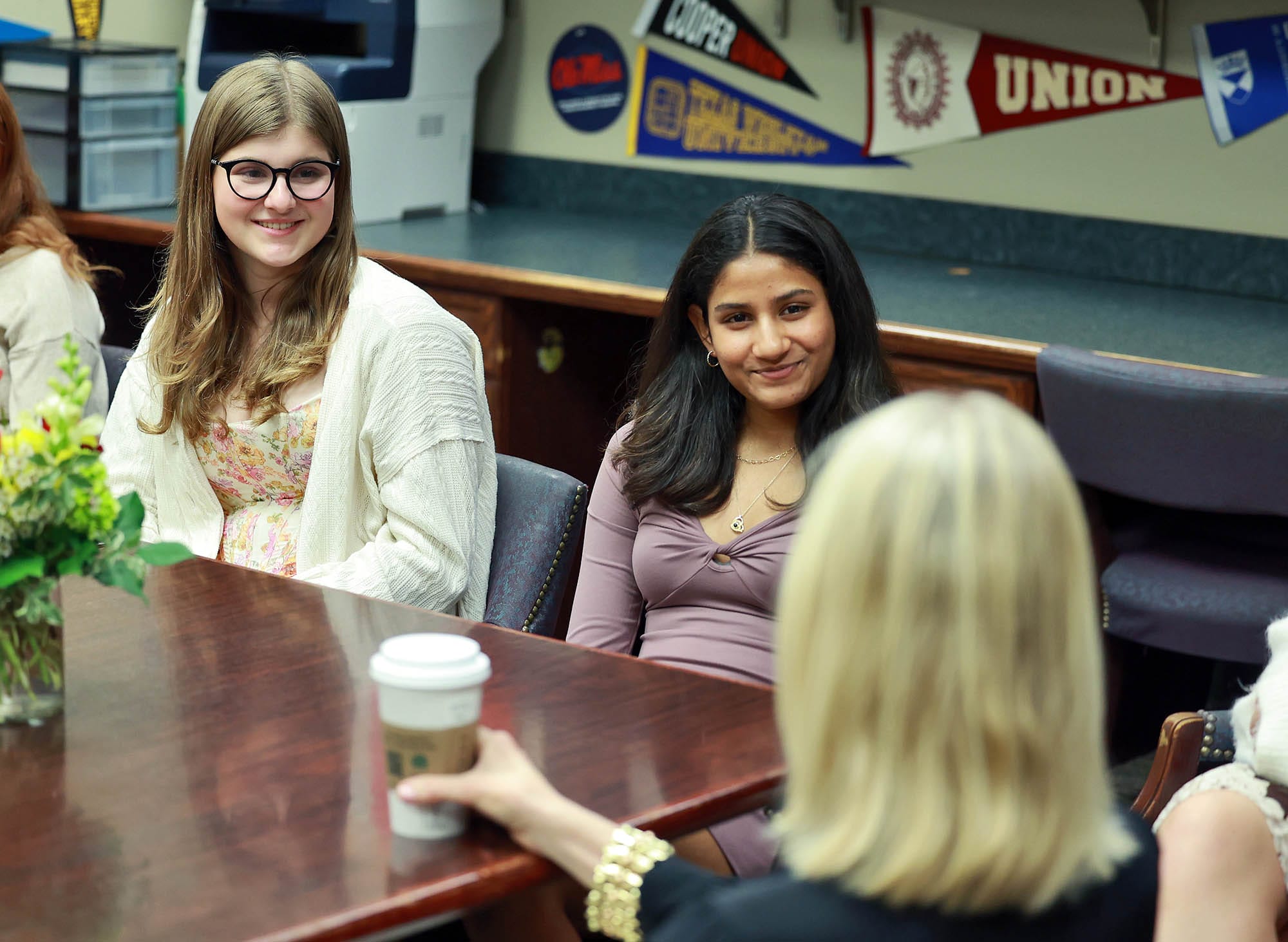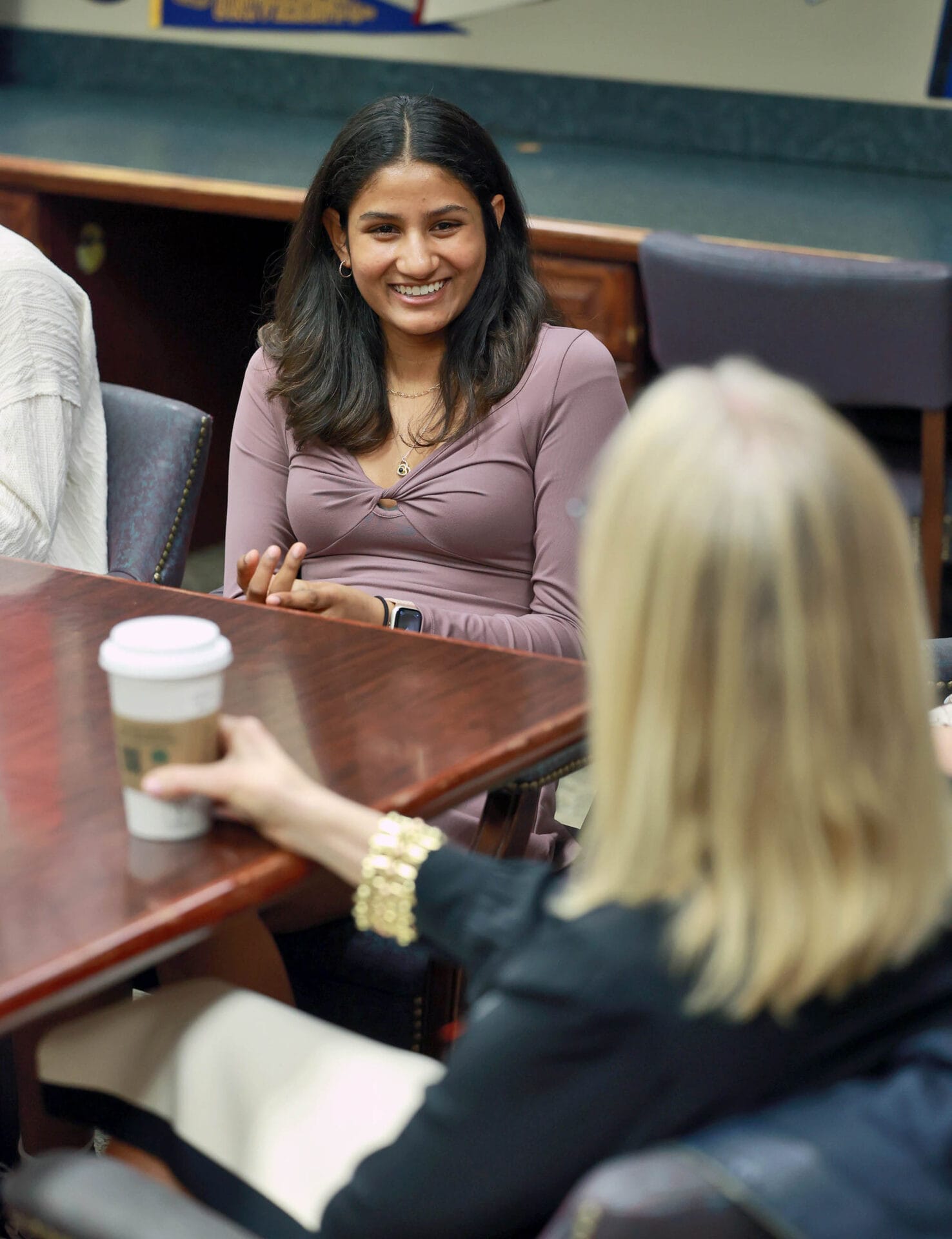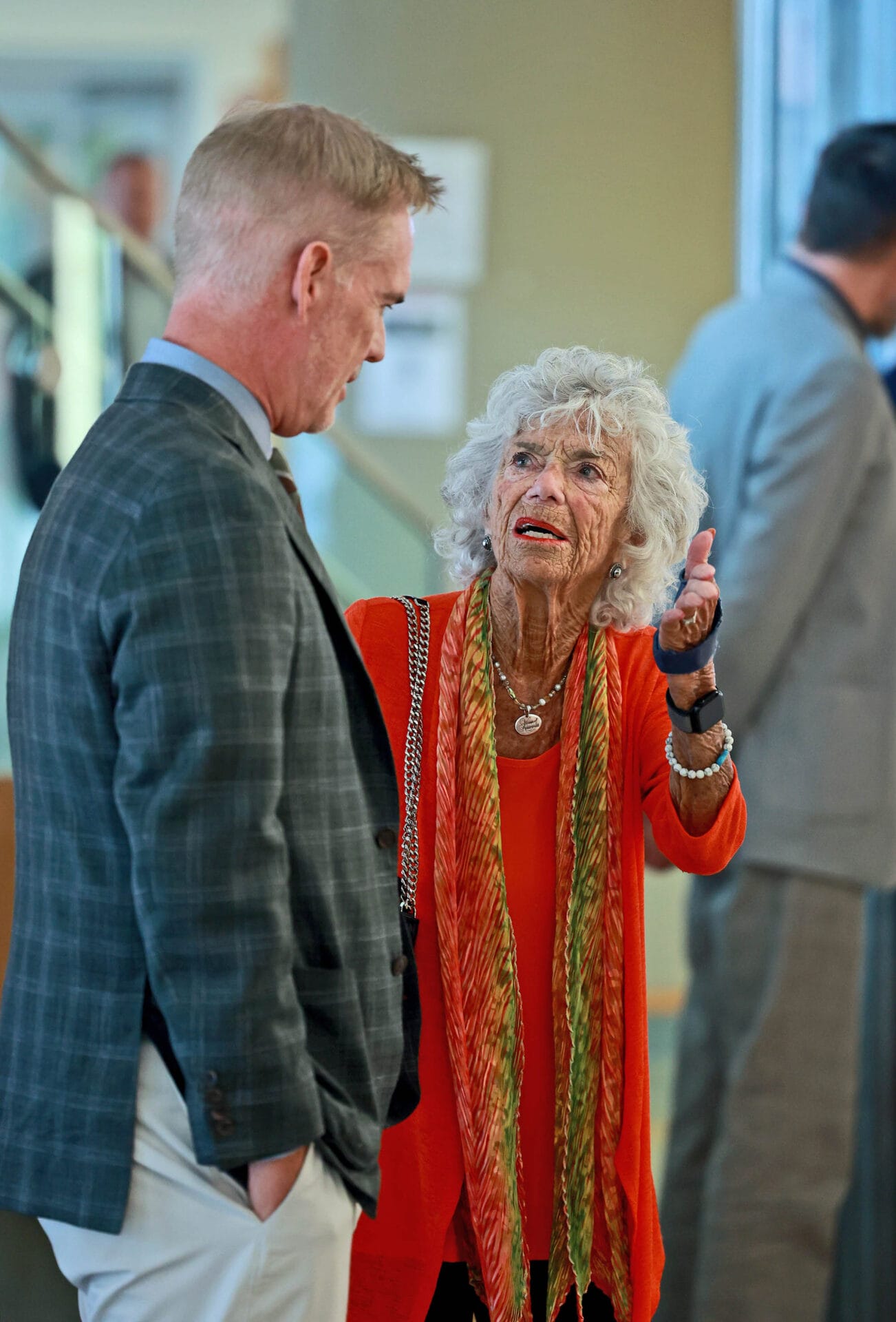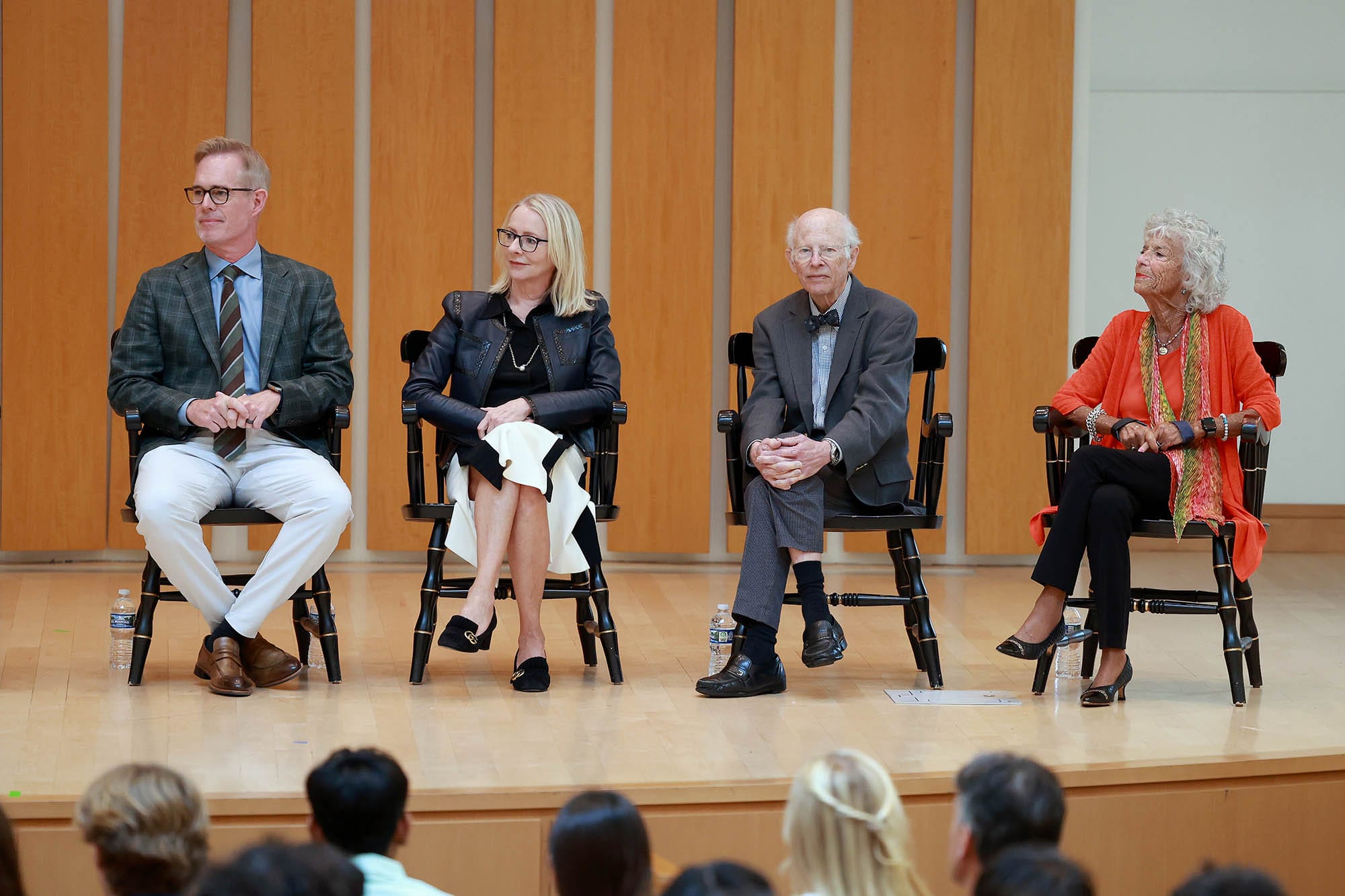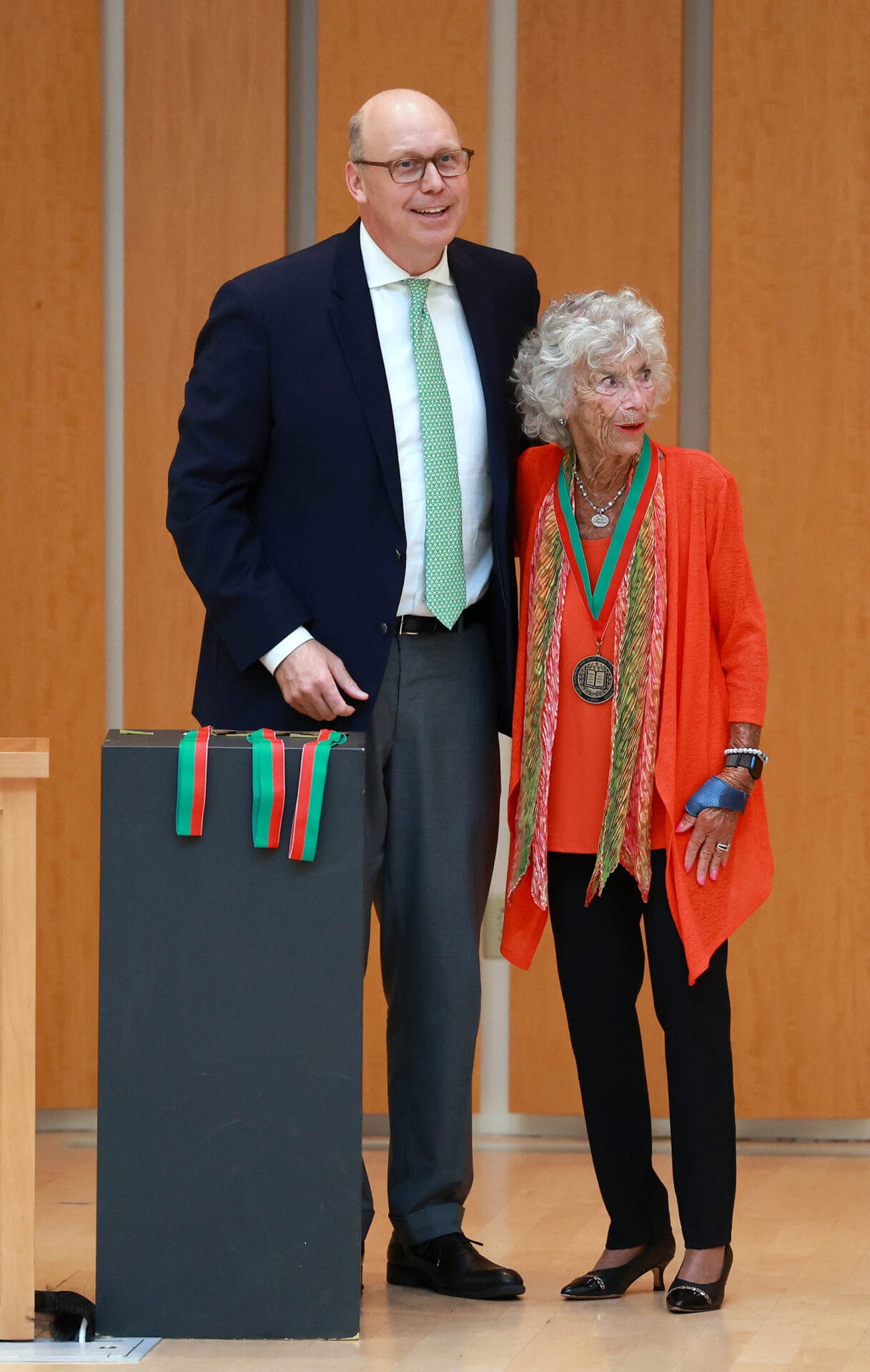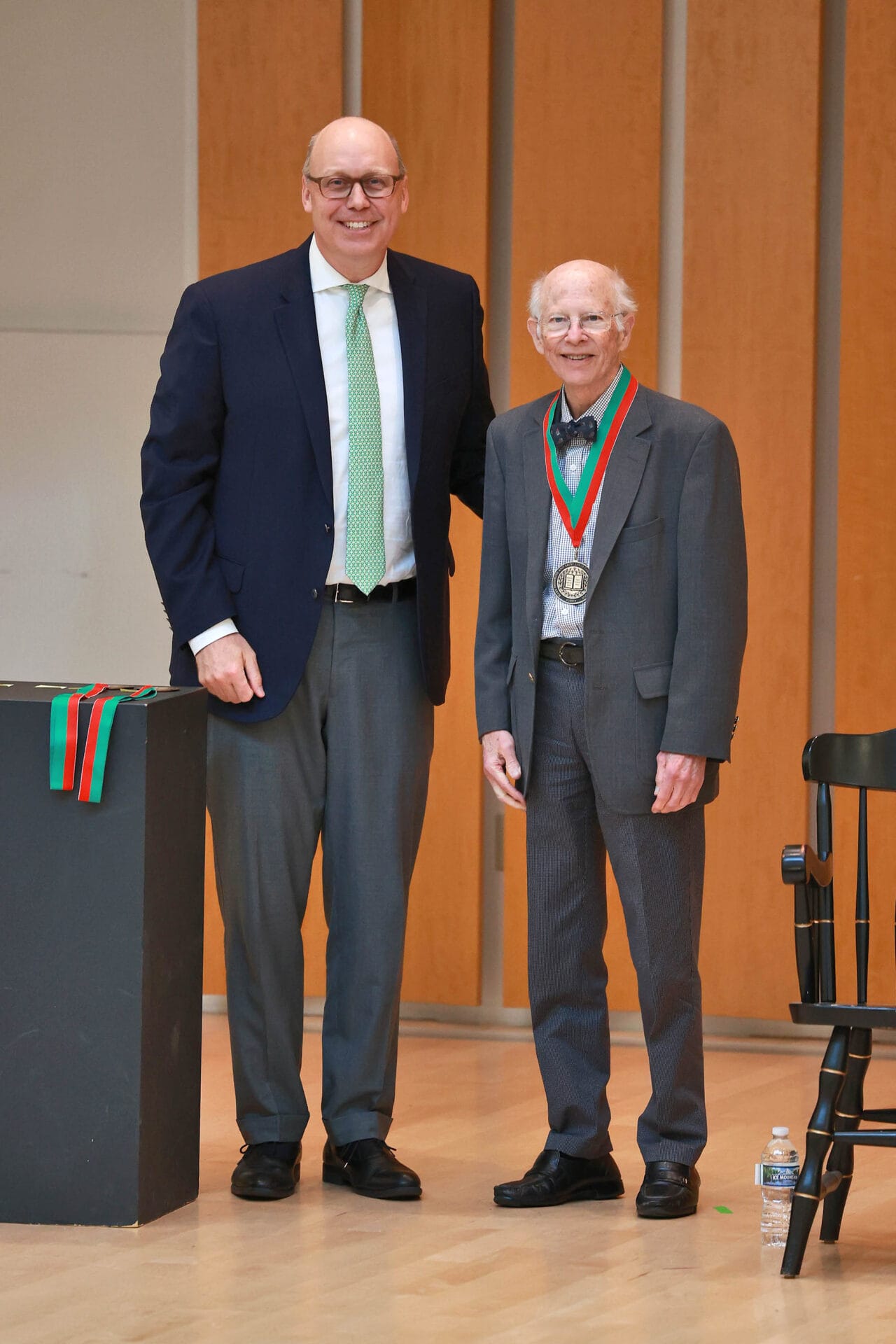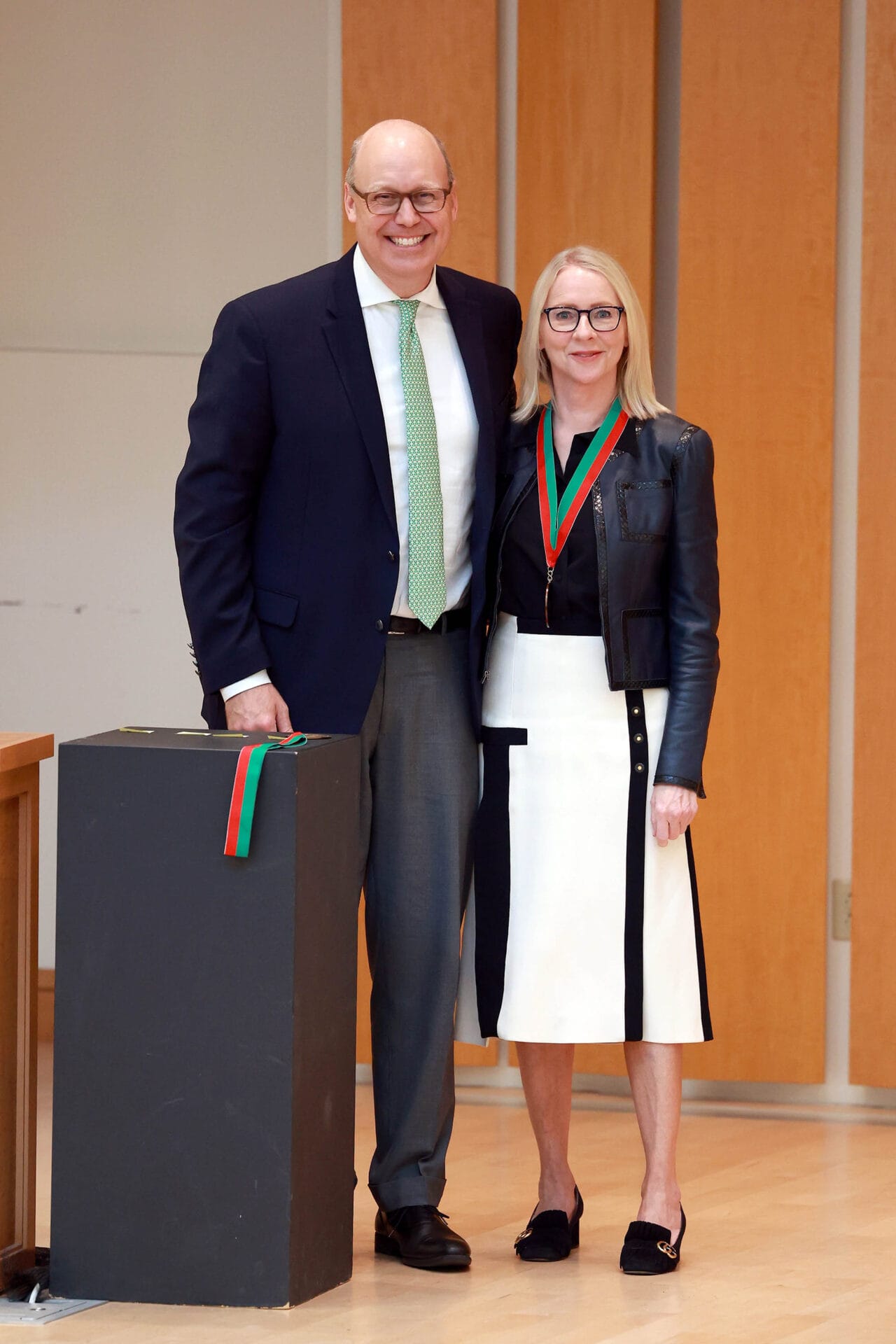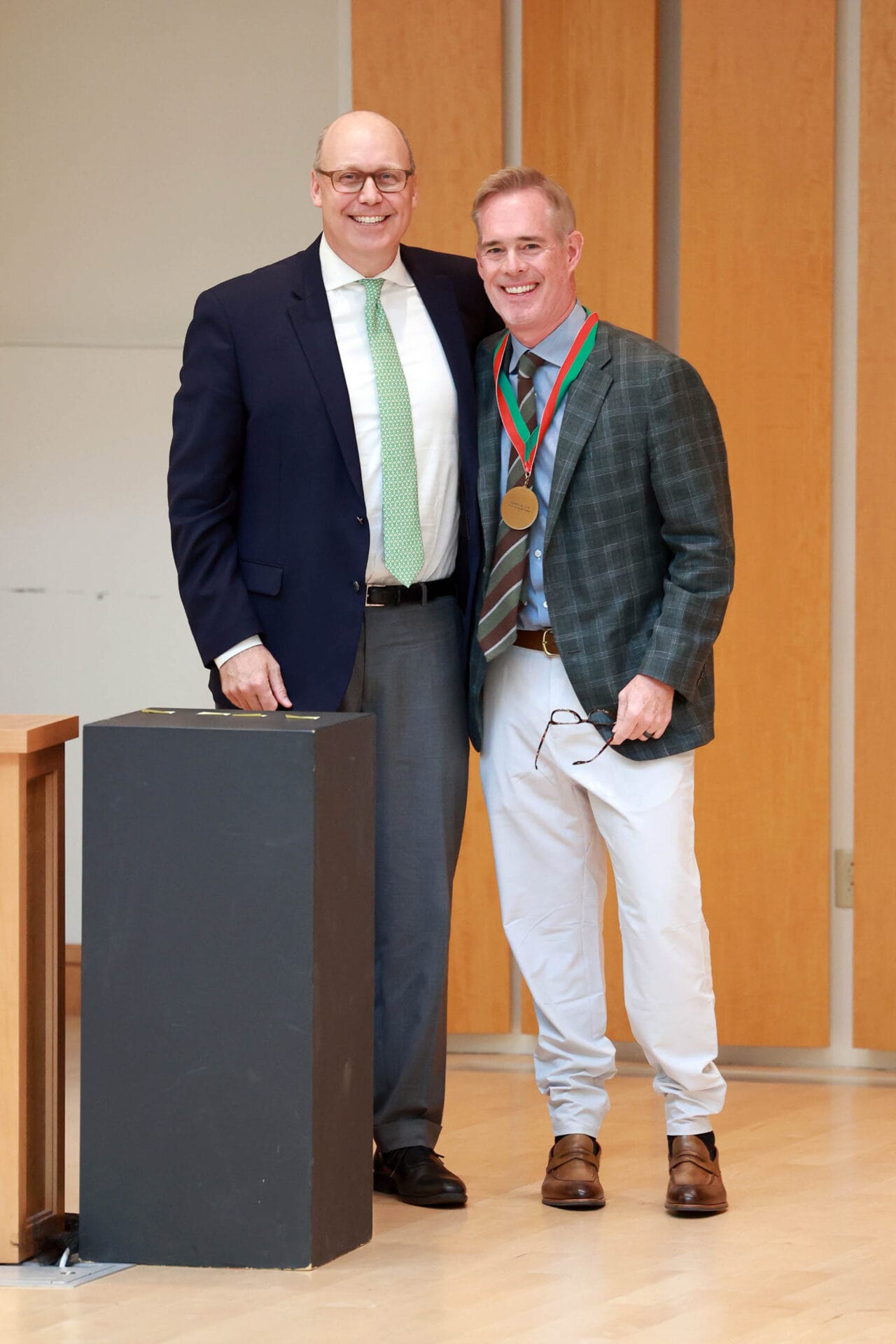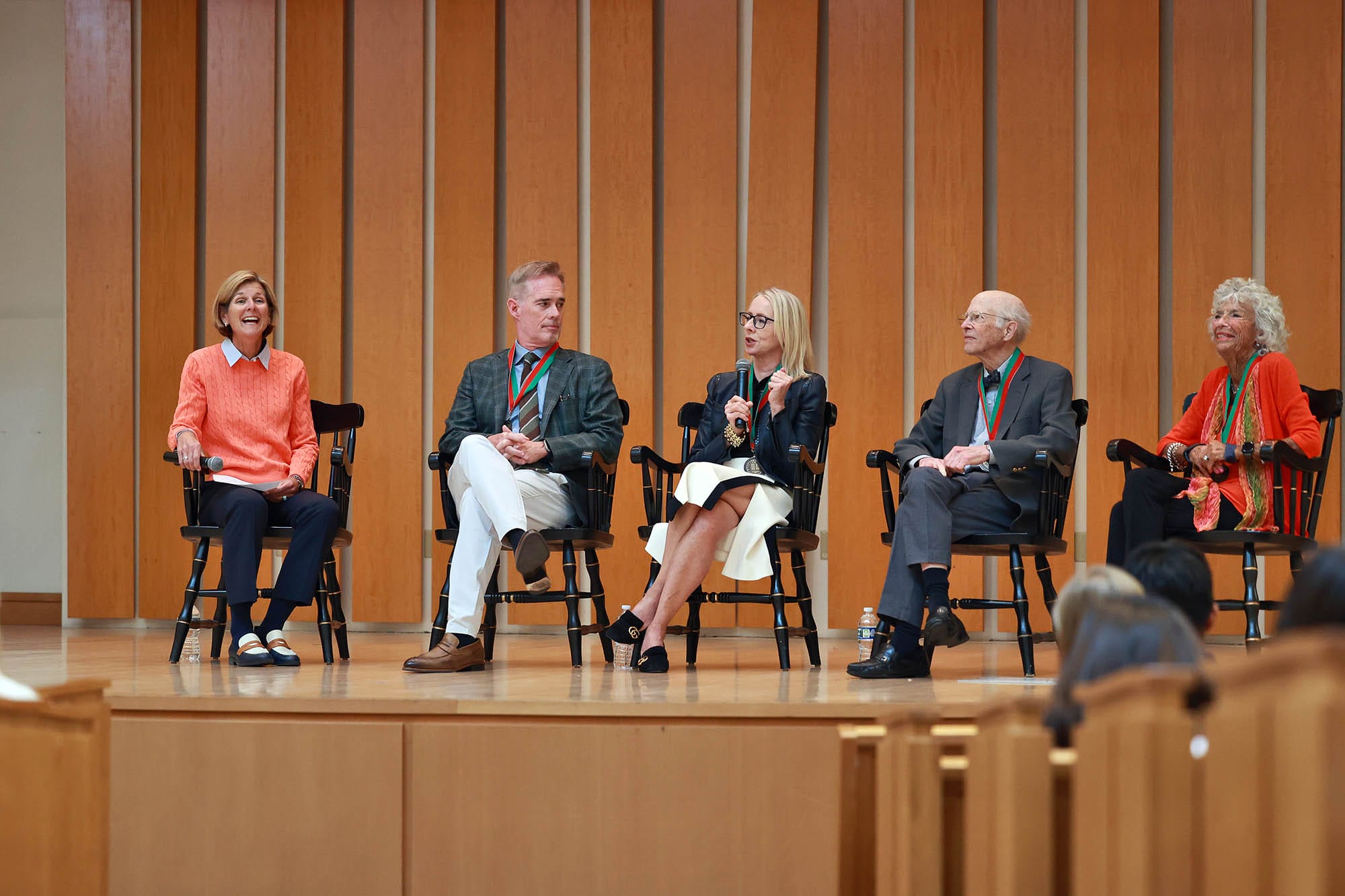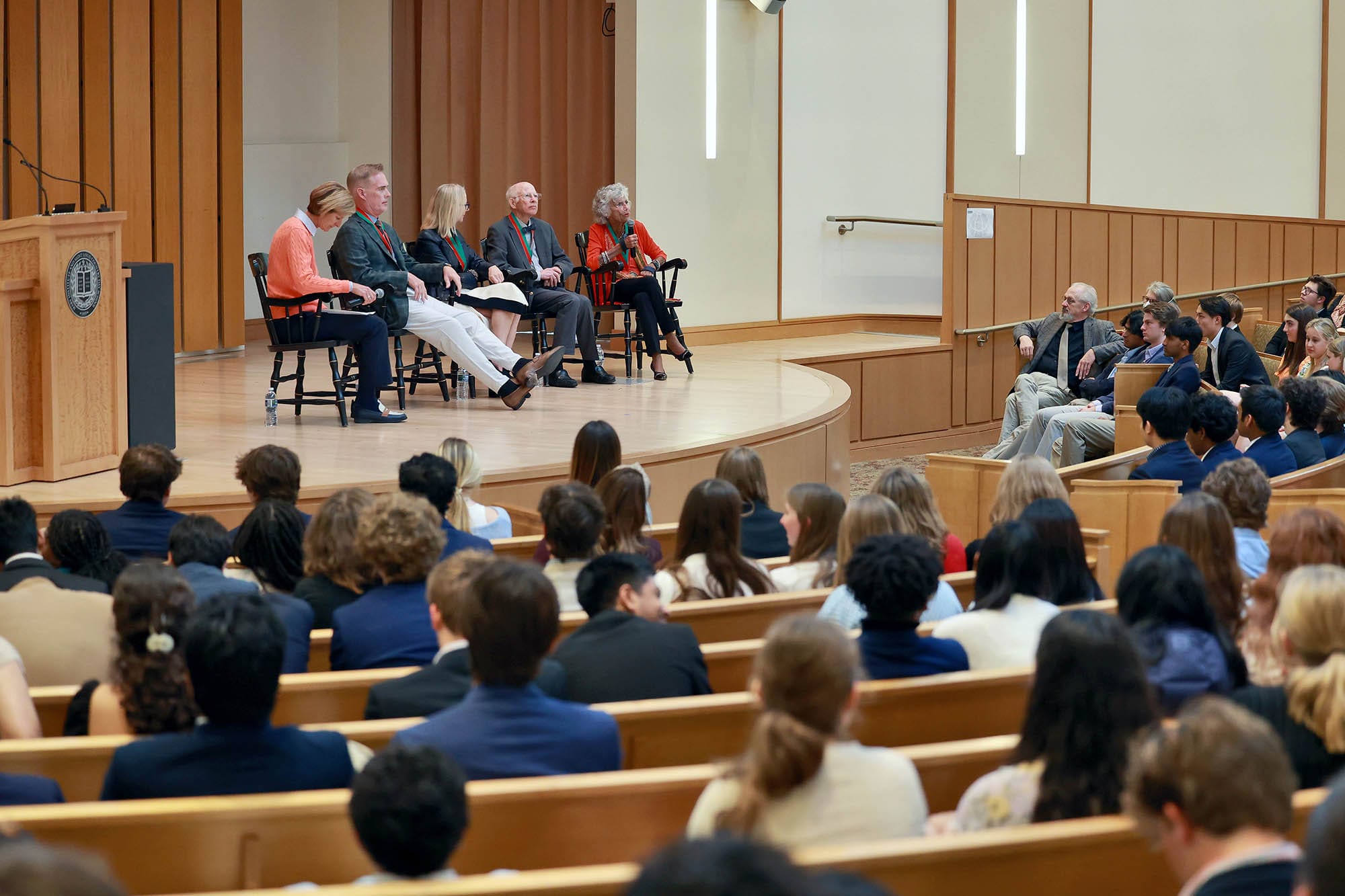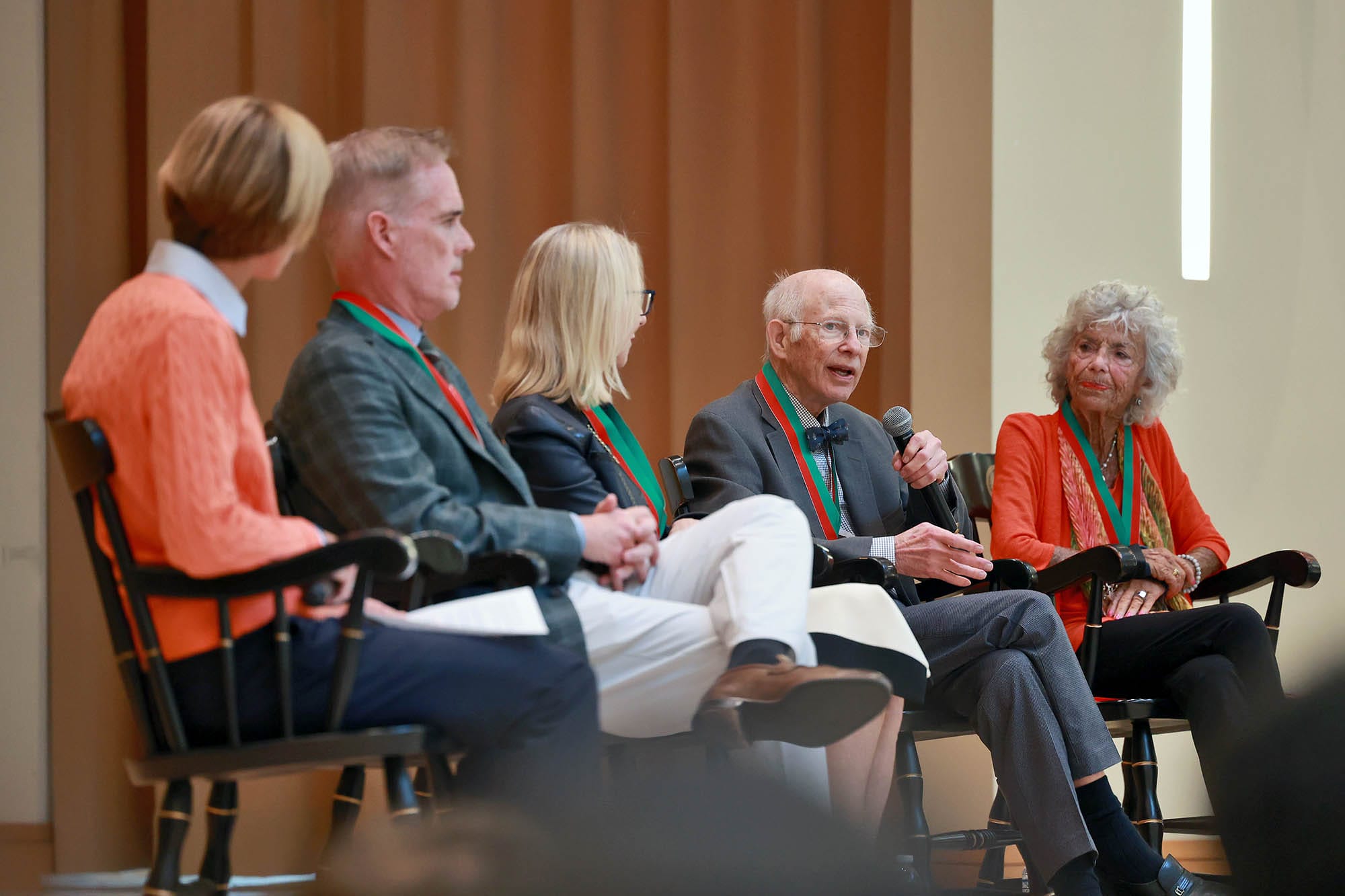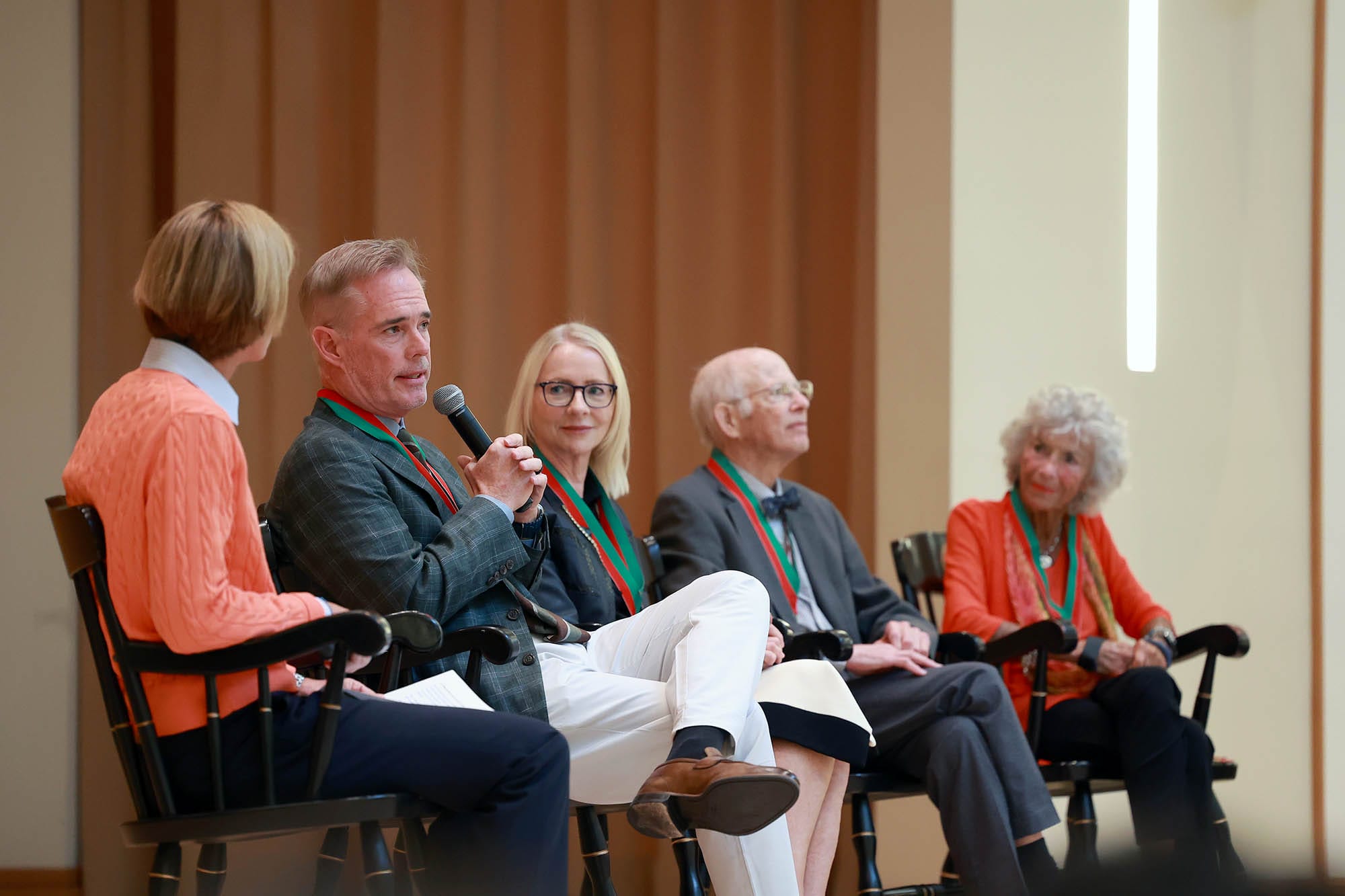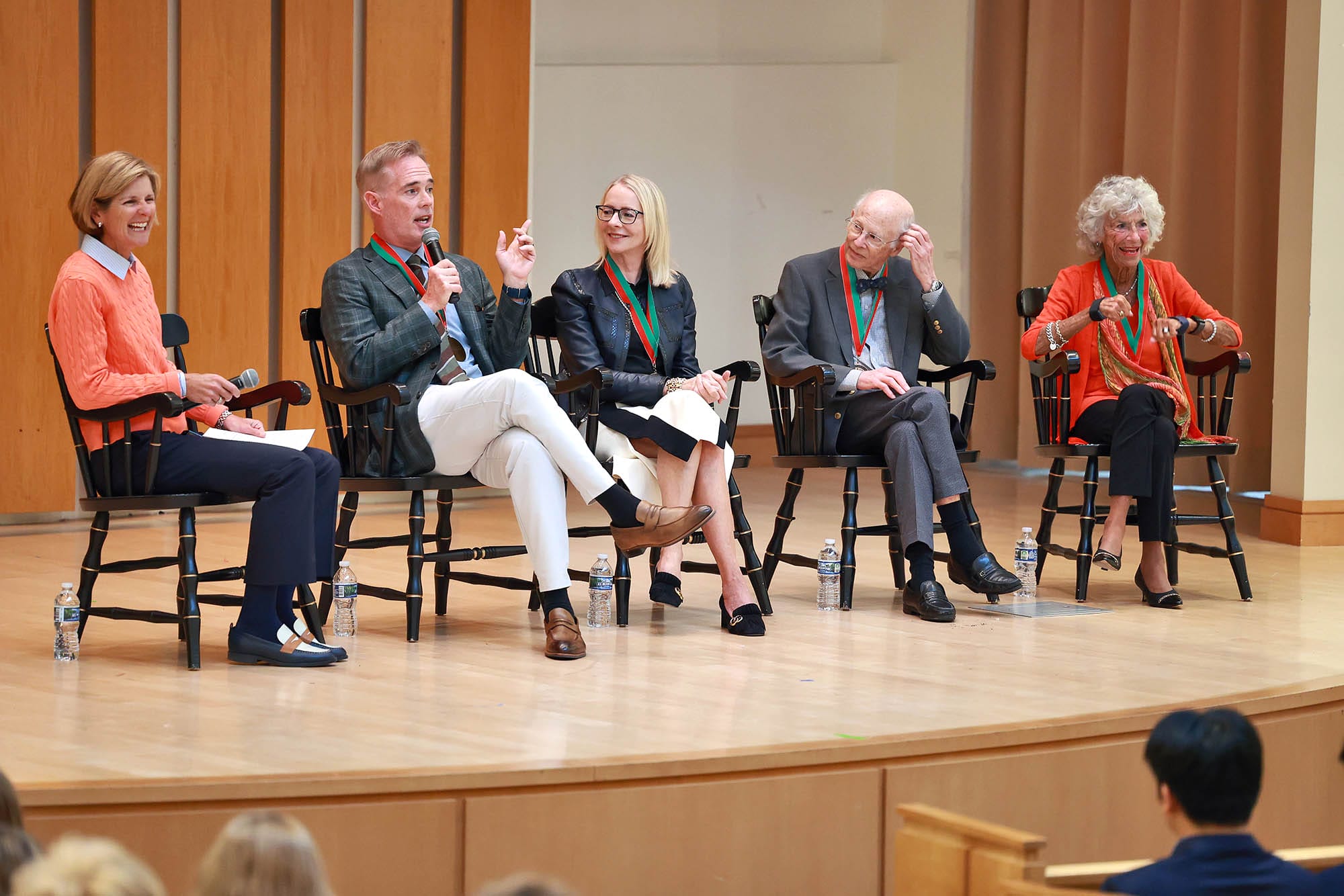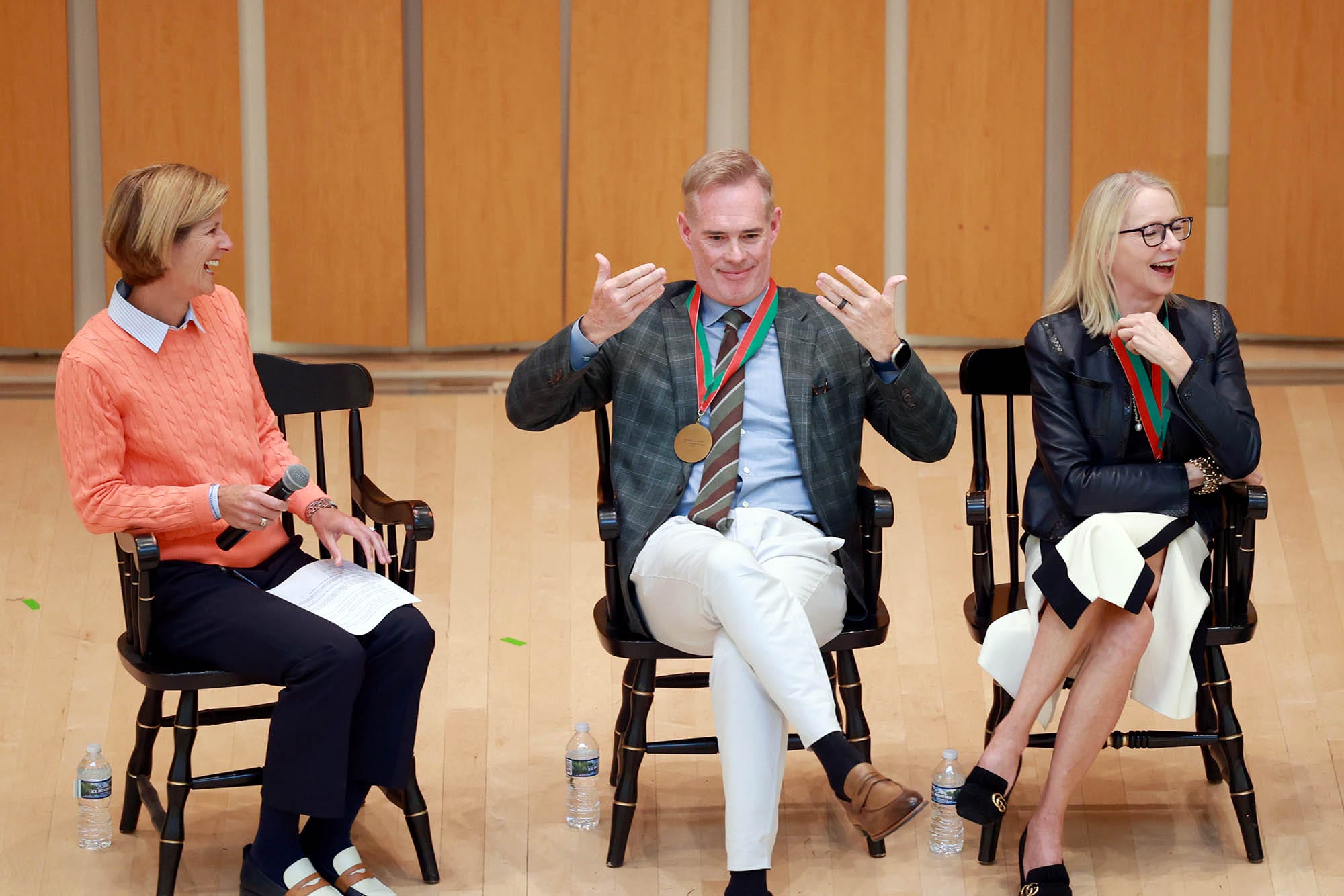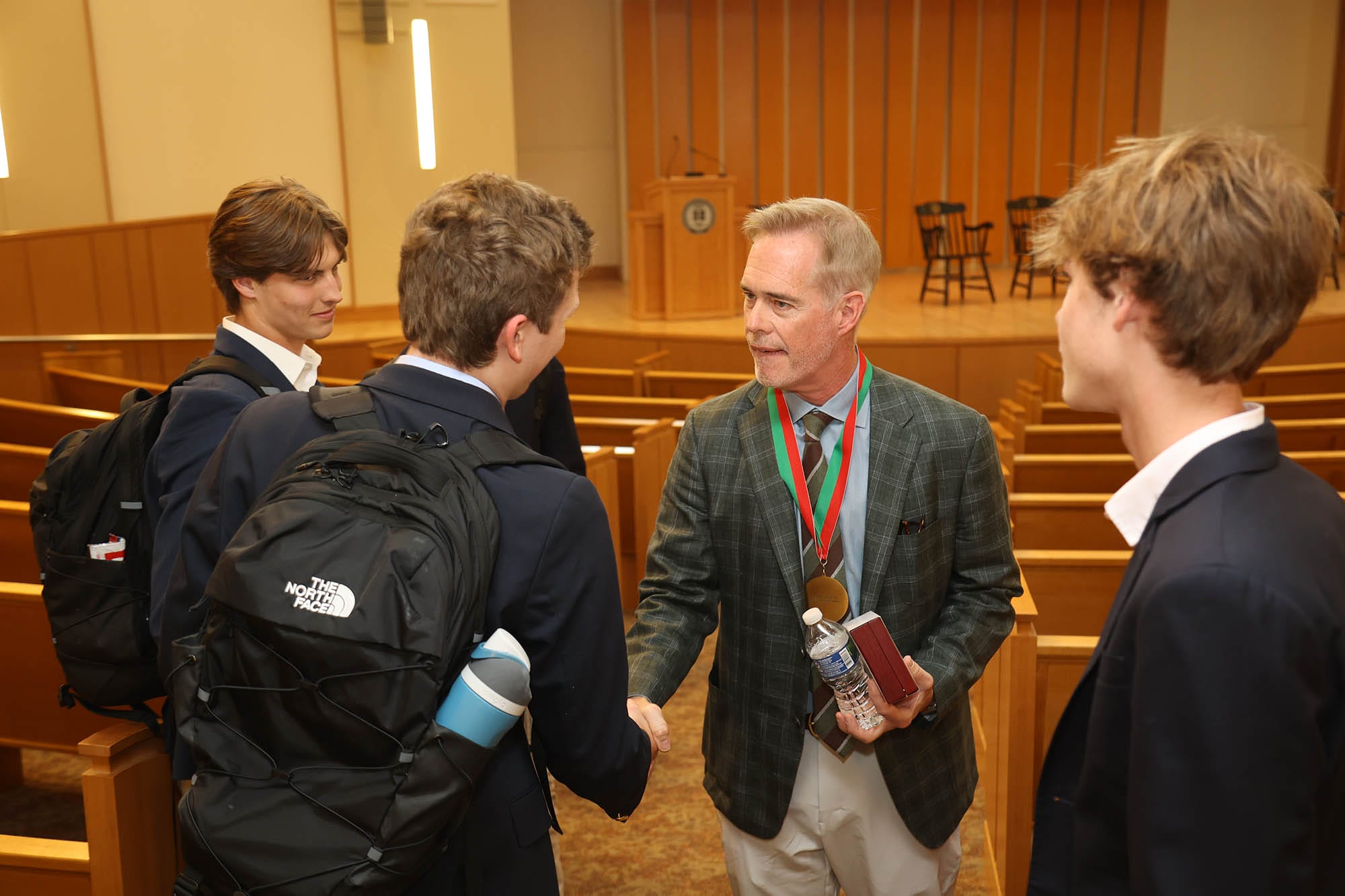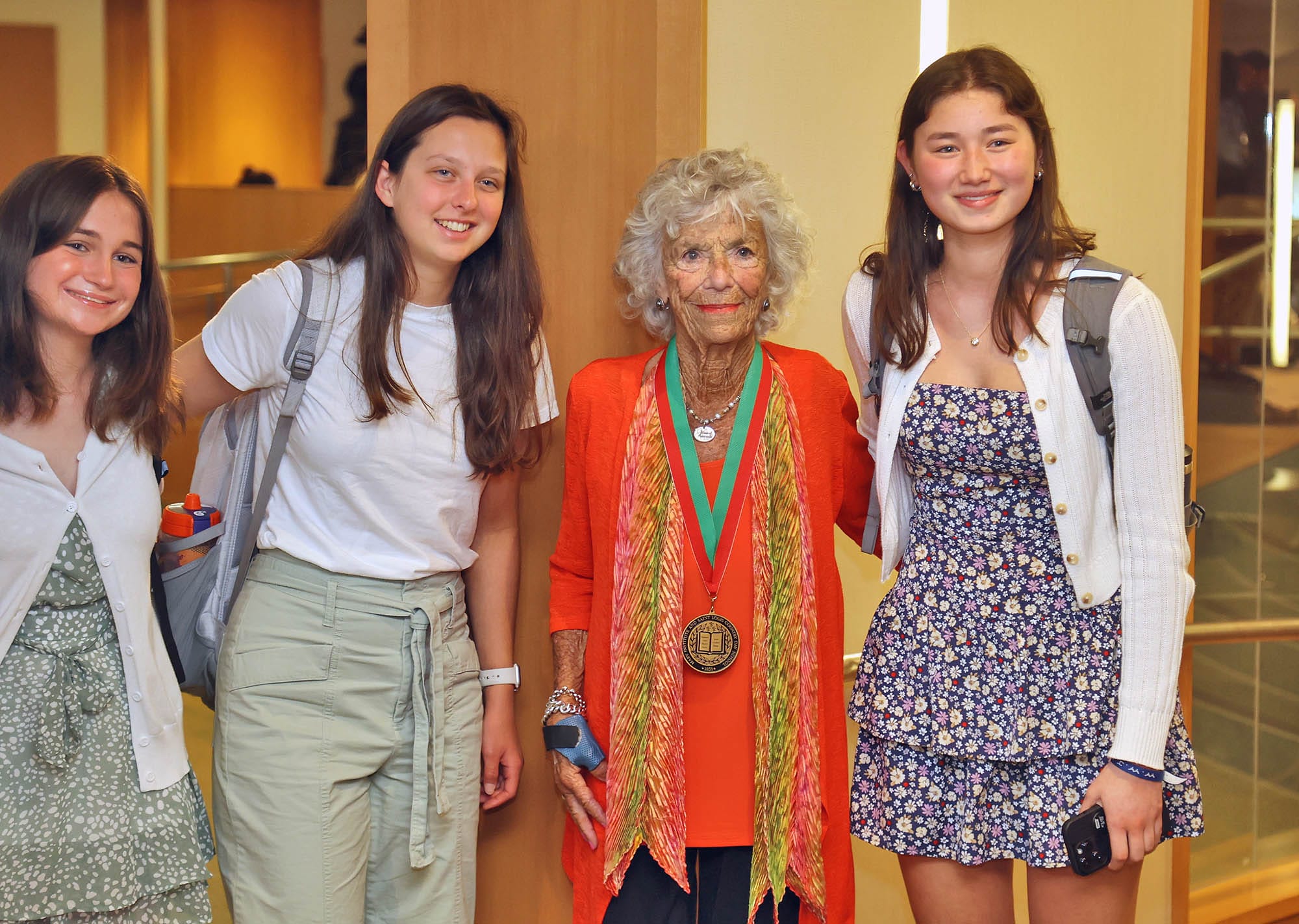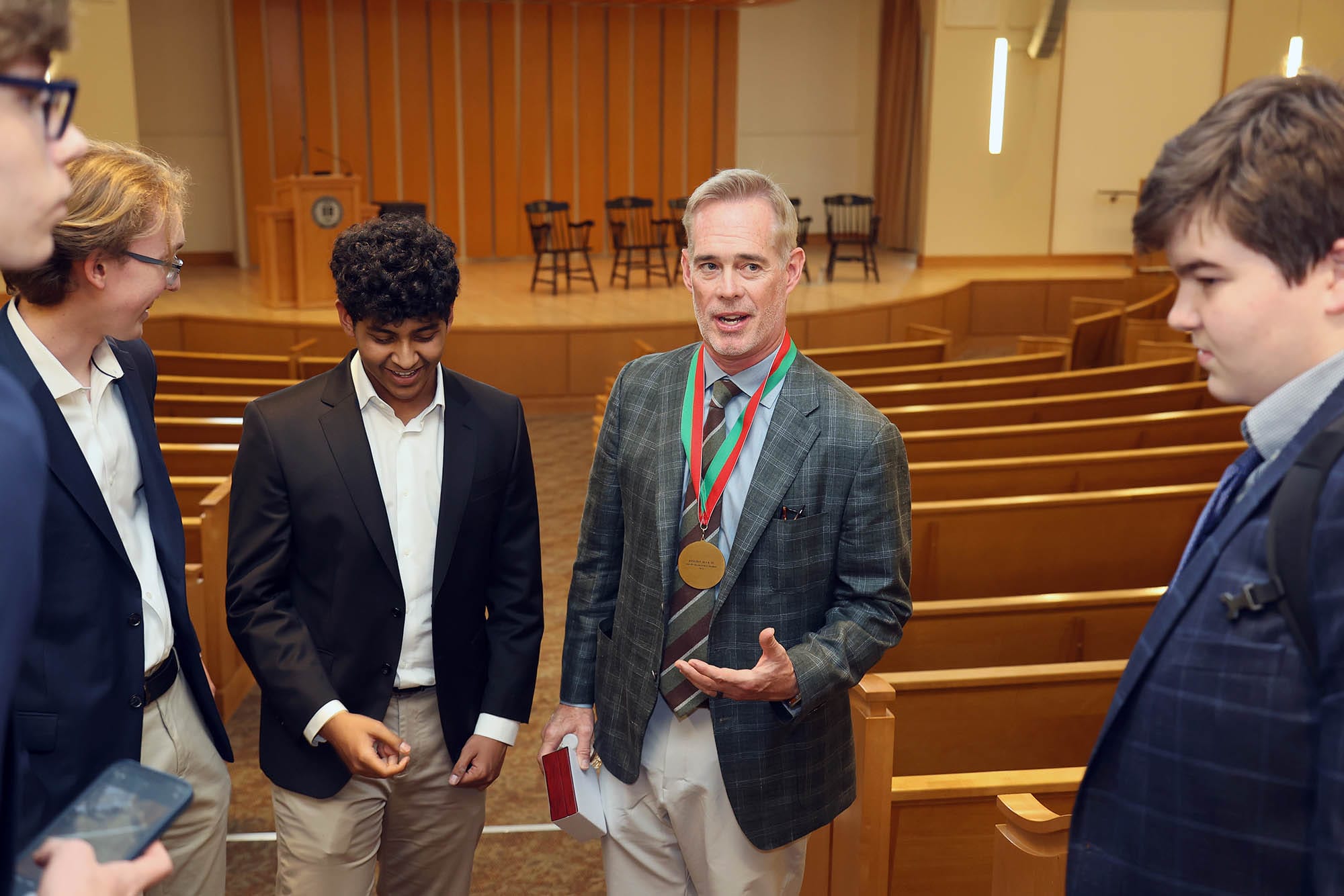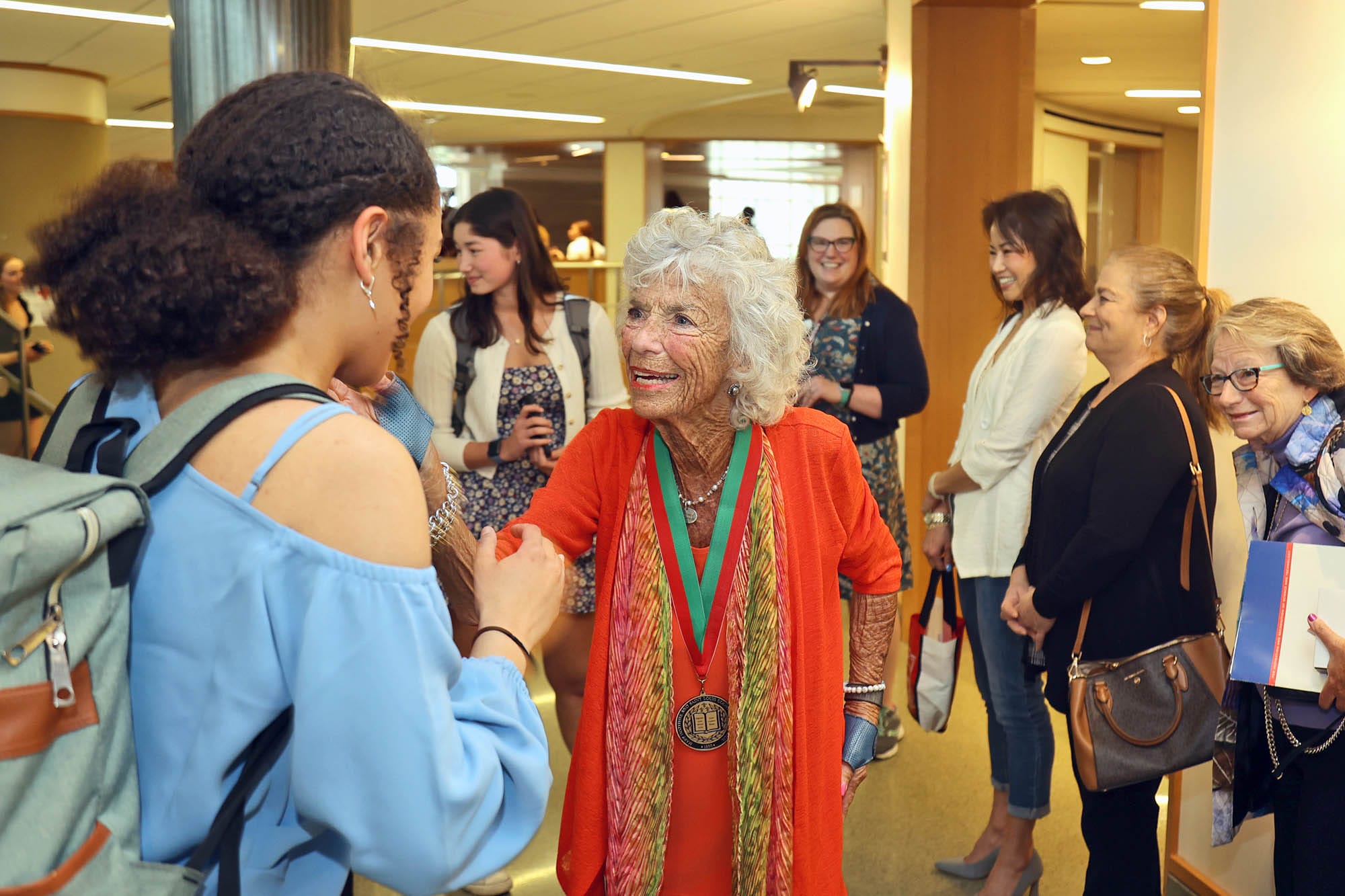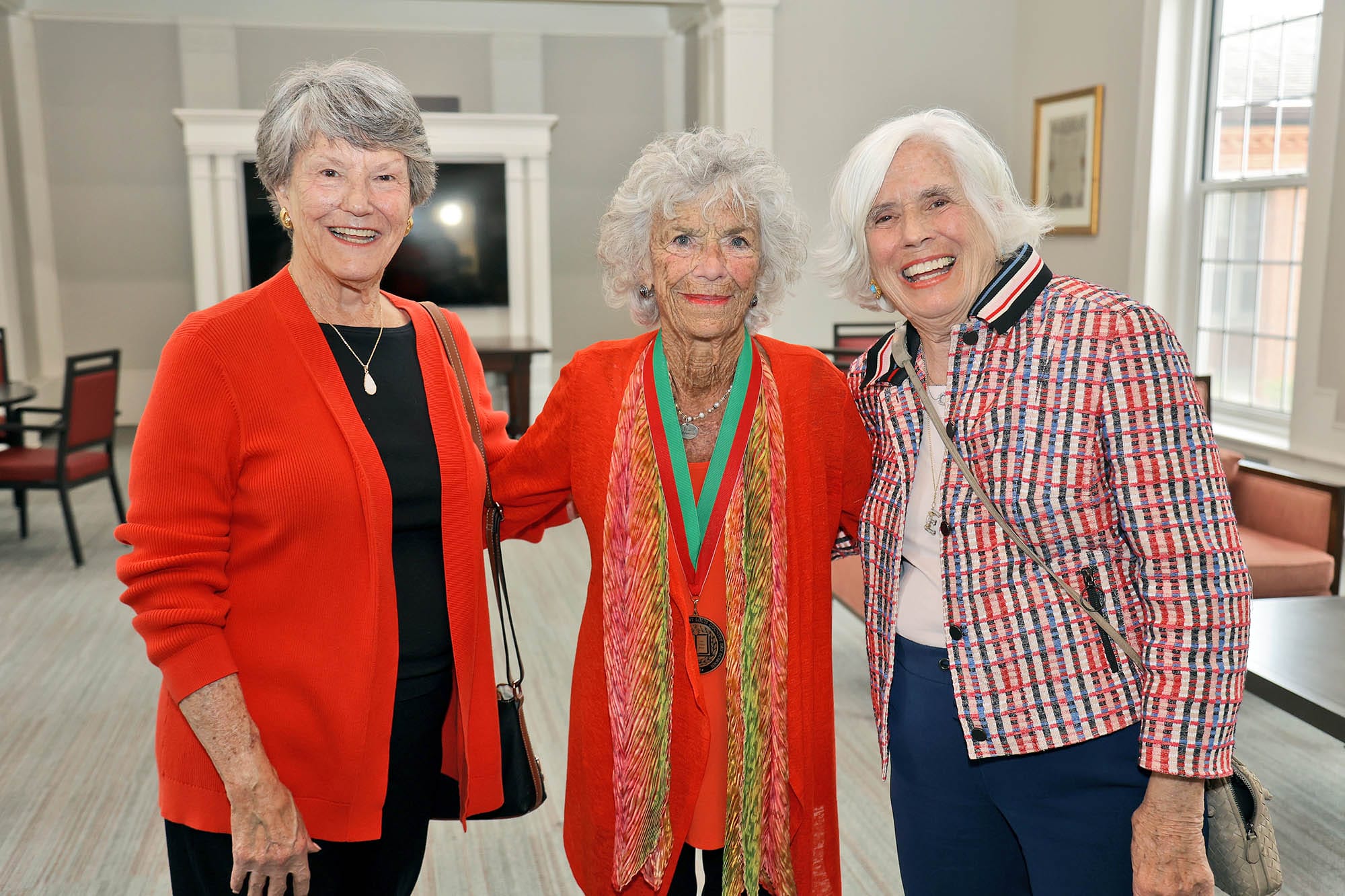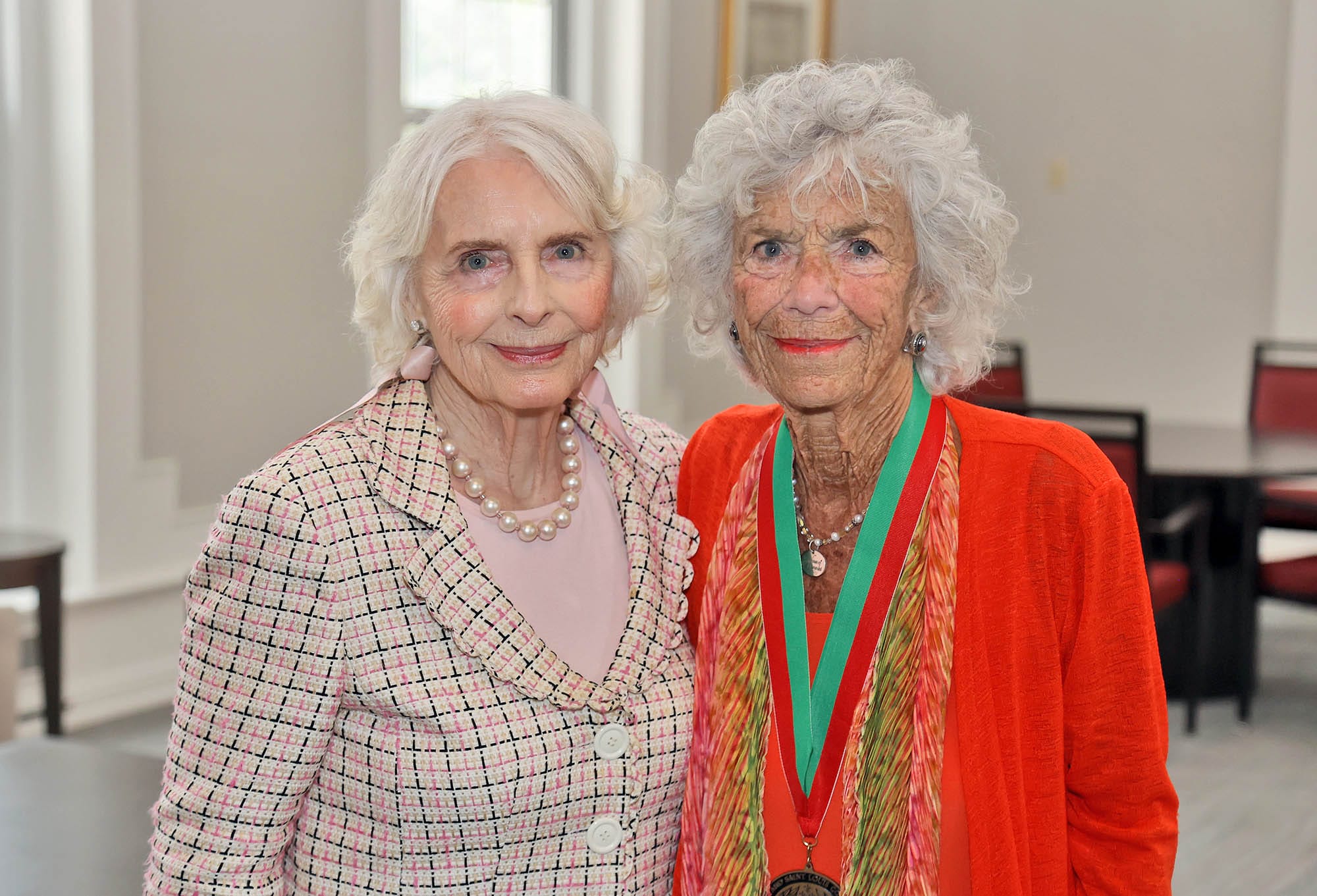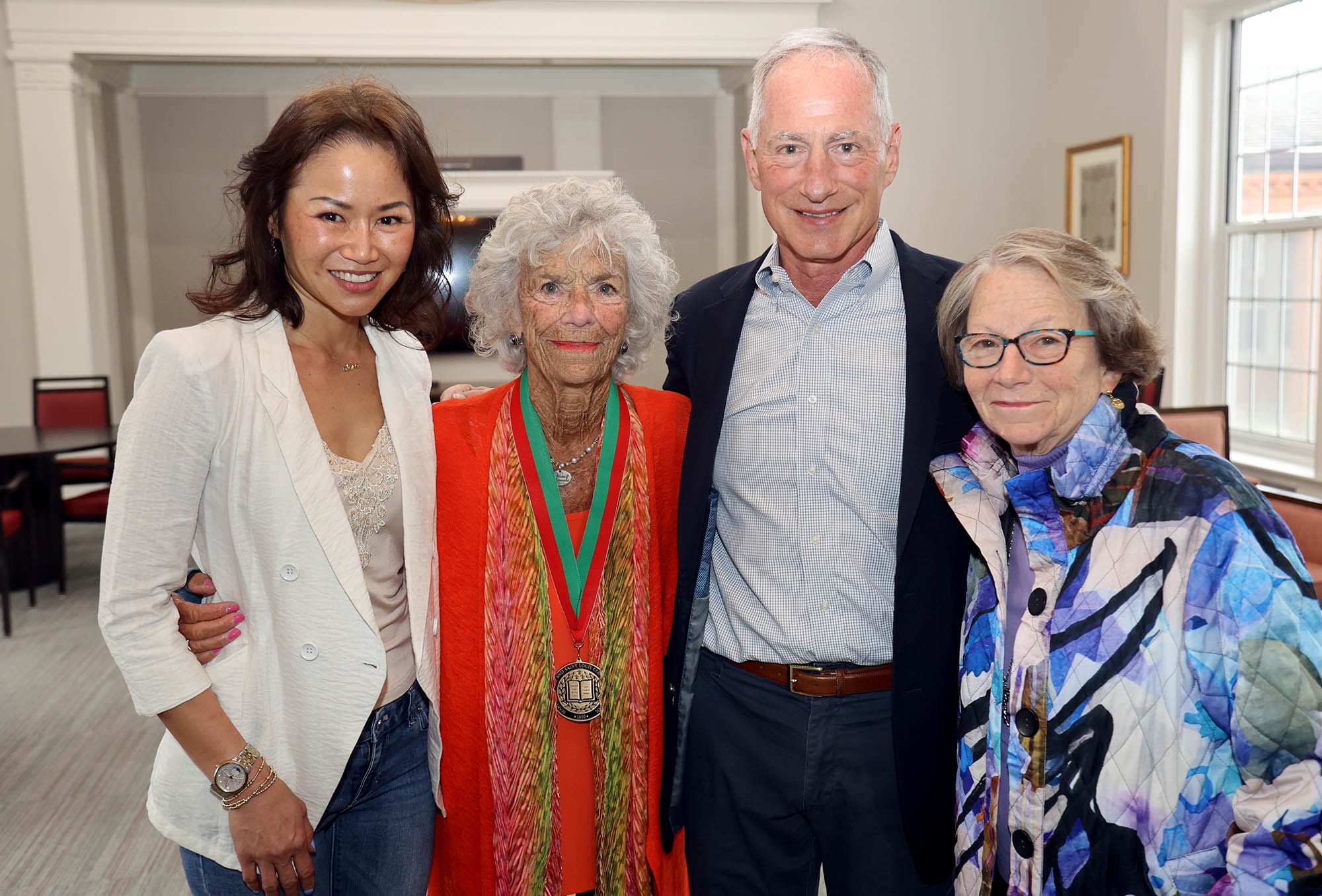On Tuesday, April 2, MICDS honored four of its own with the Distinguished Alumni Award, presenting medallions to Carol Bodenheimer Loeb ’59, Dr. Jay Mason ’64, Linda Wells ’76, and Joe Buck ’87 at an Upper School Assembly. These alumni had spent time earlier in the day with small groups of students, sharing their experiences in intimate settings while also learning a little about what it’s like to be an MICDS student today. After the Chamber Choir sang the Alma Mater and Head of School Jay Rainey introduced and presented medallions to the alumni, ninth through 12th-grade students were treated to a lively panel discussion with our honorees, moderated by JK-12 English Department Chair Lynn Mittler. Mittler asked our alumni questions that had been submitted by Upper School students.
“Each of you has broken barriers in your field and beyond,” began Mittler. “Tell us about your hardest barrier and what you needed to do to accomplish this?”
Loeb kicked off the answers. “The hardest barrier for me was 61 years ago when I started my teaching career at JBS. I entered a male-dominated math department, which wasn’t unusual then,” she said. There were four male math teachers who were all 15 to 40 years older than Loeb, and well versed in teaching. She noted that they were all out of their element: they had never taught in a co-ed environment before, and she had never taught at all. “I forged really strong relationships with them, and relationships with other faculty members and the administration. I earned their respect by performing well. I tried to be energetic and collaborative, not competitive, and confident but not cocky.” She noted that, thankfully, times have changed, and it’s much easier for women entering the workforce.
Mason explained that he desired to conduct clinical research and to do that, you need money. At the time, much of the funding for research came from chemical companies, and those companies decided what to research, how to analyze it, and how it was reported. “That, I did not like,” he said. After determining that there was funding available through grants, he set about making it happen. “I studied the game. I learned as much as I could about grant funding mechanisms and how to convince, reading research grants every quarter. I submitted a hundred research grants a year, sometimes 30-40 per quarter, and each grant would take 20 hours. The payment for this was zero, but I learned how to write a grant. The trick was that your idea didn’t have to be that good; it could even be bad, but if you could present clear logic on why it should be studied and if you could state it in writing with great clarity, that’s all you had to do. I ended up being awarded about $90 million in National Institute of Health funds. I want to give thanks to Country Day for that, now MICDS, because the clarity of writing is so critical, more than the idea and even more than the logic behind it.” He reminisced for a moment. “My writing skills just got hammered by an English teacher who was only here for three years: Alan B. Howard. He took a red pencil to everything we wrote as students and just hammered it. You really learned how to make a concise statement. So, MICDS, thank you for those $90 million dollars.”
Wells shared about the challenge she faced when she transitioned from writing for Vogue and began at The New York Times, and elaborated on Mason’s thoughts about learning how to write. “I was the lightweight of all lightweights,” she said. “I was reporting beauty and fashion in a world where the value was in being a war correspondent and being a serious person. I was not a serious person. I was hired on trial for about three months, and they would decide whether to keep me based on my performance. It was a lot of pressure. I decided I would bring the same type of reportorial rigor to a subject usually treated as ditzy, and report the living daylights out of it. I made it cultural. I found the meaning out of what was going on, because there’s cultural meaning in everything. I learned how to report by watching everyone else report. I killed myself in order to make what I was doing respectable. That really worked out. I had a similar teacher [as Mason]. I had a teacher here who pushed and pushed and was so annoying, and she would not let it go, and I’m so grateful for that. The skill of writing is so diminished, and yet writing is so important to clarity. You don’t need a writing career to find value in writing. I had the value of that at MI, plus a real need to watch and improve all the time. That was a really important aspect of success for me.”
Buck took the conversation in a humorous, salty direction. “I wrote a book called Lucky Bastard,” he stated. “I am both lucky and a bastard.” He was charmingly self-effacing. “To think I broke through barriers is comical. I am the luckiest person in the history of anyone who earned this award. You all are too young to remember my dad. His name was Jack Buck. He was a Hall of Fame broadcaster for the Cardinals, and he worked for CBS and NBC. I got to have a master class in my home and every night of my summer and most of my school year from one of the best to ever do it. I walked the halls in the roaring 80s as Jack Buck’s kid. I’m in awe of the three people to my left.” Buck then admitted that perhaps it wasn’t the easiest to be the son of a well-known personality whose career matched the one he wanted. “I was trying to put the idea of being Jack Buck’s kid to the side and forge my own career and make my own way. I am now 54, and I still think of myself as Jack Buck’s son.” Although he has earned his own spot in the Sportscasters Hall of Fame and numerous accolades through years of hard work, he remains humble. “I broke no barriers. I’m a lucky bastard, and I’m thankful I went to school here,” he said.
Mittler shared the next question: “If you could go back to high school knowing what you know now, is there anything you would do differently?”
Loeb at first said she wouldn’t change a thing. “My 13 years at MI were very functional, happy, simplistic years, where we could walk around the city and not worry about crime. We had freedom that you all don’t have because times are so different now.” She shared a fond memory of a typical day: the figure skating club taking the MI school bus on Wednesday afternoons to the winter garden to skate, enjoying a meal at the Parkmoor before returning to school, and then maybe going home to study. “If I were to be serious and go back to school in the 50s knowing what I know now, I think I would be a much better steward of the earth,” she reflected. “I would be much more aware of my actions, pay attention to water consumption, recycle more, and pay attention to conservation, all the things we have to deal with as a global issue now. If I were to go back now, in the 2020s, I think would immerse myself in technology: programming, coding, and artificial intelligence. The thing I really want to do is to learn every language of the world so I can communicate with everyone face to face in their own language and meet people where they are.”
Mason said he would specialize in his studies. “Pick one area, one class, and go way beyond that. Specialize in something. Do it by taking advantage of what is available to you here. At Princeton, we had a preceptor system. Every large class—defined as 30 or more students—had an extra class several times a week where you could go to and sit down with a preceptor and learn more. I never did it, not once. I never went to my CDS teachers and tried to take advantage of those teachers’ expertise. You learn how to learn by doing that. What you learn at MICDS, what you learn in college and graduate school, is a drop in the bucket compared to what you have to learn to be successful. There is a wealth of information available on the internet; please learn how to learn and do it now, while you’re in high school.”
Wells shared that she liked school and is grateful for everything she learned, but “I would have taken SAT tutoring, probably from Carol. I took the test only once, and I didn’t do well, and I didn’t get into the school I wanted. I had to make my own education and push it further.” She credits her time at MI for opening the world more to her. “I went to live with a family in Turkey when I was 16, and it was an exceptional opportunity that I wouldn’t have gotten if I hadn’t been here.” She wishes she’d have done more of that. “I’d get out of my world and put myself in uncomfortable situations and do things that weren’t easy, instead of swimming all summer. I should have tried a little harder to get into a better school. Other than that, it was a great experience.” Then she paused for a moment and continued. “I wouldn’t have smoked and drank Diet Coke and sunbathed simultaneously. I wouldn’t recommend it.” The audience laughed. “But you guys are much smarter than I was.”
Buck said that if he could go back, he would not have gotten up one snowy weekend morning, gone to campus, got into a snowball fight with friends, and broken a window. “I felt guilty for weeks,” he said, finally admitting to the head of school that he had broken the window. “That’s the type of person I am. I carry guilt. I was the good kid,” he said. “There’s nothing I would do differently, but I would tell myself now, as a 54-year-old man looking back at a 16-year-old kid, ‘Be more positive. Have a better self-dialogue. Put the schoolyard self aside.'” He told a story about being overweight and made fun of by a boy a year older. “It made me tough, but it wore me down. I learned to use words to turn attention back on that kid. So, if I went back, I would learn to navigate high school as a confident kid, knowing that everything would be ok. Life is what you make it, this school is what you make of it, and the next level after you go here is what you make of it.” He matriculated to Indiana University and it was a great fit for him. “It was gigantic, and I was just a number. I could find my own way and my friends and see where I fit. If you have a lack of confidence or you think the weight of the world is on your shoulders, it gets better and you grow and mature and find your people and blossom. It took me a while to come up with something, but I would want to be a more confident person as a teenager.”
Mittler asked the panel a third question: Risk is inherent in the work you do. How did you overcome failure and achieve success?
Loeb shared that her greatest personal risk was when she left the formal environment of teaching in a school and began tutoring students in her home. “There’s not a lot of risk as a teacher,” she said, “You’re embedded in a school environment with an administration, and there are a lot of layers to your protection.” When she began tutoring students to take the SAT, the stakes felt higher. “You have a personal risk because you want your students to do as well as they can in whatever discipline you’re in. On standardized tests, you want their scores to be high enough to get into where they want to go. You have to try different ways of teaching and accommodate their learning styles and personalities. So you work harder and harder and do whatever it takes to make the learning experience a positive one for your students.”
Mason’s sense of risk is also tied to other people. “My risk is my patients’ risk,” he said. He spoke about his time at Stanford when he specialized in studying cardiac arrhythmia and sudden death. Most people don’t survive sudden cardiac death, but those who do require treatment and protection against having another episode. “I had a lot of referrals coming to me. The problem was, however, I treated them, it had to work because if the treatments weren’t effective, they would die. The method I developed involved putting electro catheters in the heart and using programmed stimulations of the heart to make beats occur in a particular sequence.” He was effectively inducing the fatal arrhythmia. “The patient would pass out, then we’d use a drug to try to initiate the rhythm again. As it turned out, it worked. That was the first really big clinical grant I got from the NIH: to settle this process where we demonstrate this works. How did we overcome this risk? Hard work. Purely by hard work. The faculty at Stanford was totally against the idea of doing this. They said, ‘You’re going to kill people?’ I convinced them with hard work and a huge amount of practice in the cath lab. We learned how to resuscitate patients. It was hard preparation and extreme prep that made it possible to overcome these risks.”
Wells shared that her biggest risks—starting a new magazine, starting a makeup line, and starting another new magazine—didn’t feel risky to her because she knew what she needed to do. “The riskiest part was the beginning: getting that first job and keeping it. It was unknown; I didn’t know what work was and what it required. Every day was Groundhog Day, and it was so hard. Each step you take makes you more capable of taking the next step, and those incremental moments are very manageable once you get in the door, and that leads to success going forward. Then, when I started Allure, all the other media people were really after it and trying to knock it down. Before we even came out with the first issue, there were articles in the Wall Street Journal saying it would be a failure. I took that inspiration to defy it, and if there’s anything you can learn, it requires a certain amount of resiliency and thick skin you develop over time.”
Buck agreed. “It’s the idea of fake it ‘til you make it,” he said. “I did that in ’94 when I auditioned to go to Fox Sports. I had done two years of minor league, then three years with the Cardinals, and then Fox Sports dropped out of the sky and had the rights to football. I had never broadcast football, and they were trying to legitimize it. I had done college basketball, horse jumping, and baseball. I was 24 when I flew out to California and did a game in front of all the Fox executives. It went well, and had that audition not gone well, the entire course of my professional life would have changed. I had worked for it, prepared for it my entire life, being in my dad’s shadow. Before I left, I practiced doing a game with my dad. He told me the do’s and don’ts, and it all kind of took off from there. That was the biggest junction that could have gone one way or the other. That was the most risky. I just went and did it. You do what’s in front of you and hope it goes well.”
Mittler’s final question was, “Do you think the world is as competitive as people say it is, and how do you persevere by honoring your personal strengths and talents?”
Buck admitted that the world is very competitive, “but there’s always room for talent and hard work. It’s easy to look at the number of people looking for a job or admission to a school and think, ‘The numbers are against me, and I’m not going to make it.’ I’m here to tell you: you are…if you’re willing to work and put the effort and sweat into it. This place is a great breeding ground. I wasn’t a great student, but I was a good kid. I tried to go about things the right way. I had a leg up, but if you are talented and willing to put the work in, there’s no limit to what you can do. Do not look at the numbers and get discouraged. Get excited that you’ll end up on top.”
Wells told the students that it always feels daunting when you’re on the outside. “It was competitive when I started. When I moved to New York there were hiring freezes everywhere. It was never easy, but you have to have faith in yourself and put yourself in a situation where you’re taking risks. You might embarrass yourself and do something stupid, but if you’re capable of recovering from that, you’ll do well. We all think someone else is lucky, or think about an advantage someone has, a legacy, or that they’re attractive or talented, and it seems like you’re not going to be included. You can put yourself in the path of luck by being really prepared and educated and doing the work.” She shared a quote from Louis Pasteur: “Luck favors the prepared mind,” and continued. “You can make yourself lucky if you work hard enough and are prepared for it. If you’re open to opportunities and not afraid of them. There are many once you get out in the world and stop getting in your own way. We all feel a little self-conscious. You have to put yourself out there and do the work.”
Mason continued along that line. “It is competitive; it’s cutthroat. It is particularly competitive in academic medicine. Clinical sciences are competing for grant money, and the competition is fierce. The payline is 5%. Only 5% of NIH grants are funded. There is competition to get your work published, to gain tenure, and move up the food chain. My advice is to identify your main competitor and then immediately stop competing with them. Instead, compete with yourself. Perfect whatever you’re doing; make whatever you’re doing better. The moment you attach your efforts to beating them, you’re attached without a stake, and you won’t be able to be as creative or able to perfect your thing as well as you could if you ignore them. Compete primarily with yourself.”
Loeb said, “Competition is inherent in the world we live in. If you don’t compete, you fall by the wayside because you won’t be as good as the next person. But as Jay said, compete with yourself. I try to use competition to be the best person and educator I can be. In no way would I ever sacrifice my morals and values and strengths to accomplish that. Your mission statement is to live a life of purpose and service and I strongly believe that. I know you all will reflect the education and values you learn here. At my college graduation, our commencement speaker in 1963 was then Secretary General U Thant of the United Nations. He said to take the privilege and value of this special gift, your education, and make a difference in the world. I can see, especially from the girls I met today, you will make a difference in the world, you already are.”
Buck rounded out the session with some personal advice. “If you were my kids, I would say, ‘Be serious, but don’t take yourself too seriously.’ Please be able to laugh at yourself. Take the pressure off, and if you make a mistake, know you’ll do better the next time. Nobody’s perfect, you’re not perfect…chill. Be nice to the person next to you. It’s amazing what that will bring your life.”
Congratulations to all four of our Distinguished Alumni, and thank you for spending time with our Upper School students this week.
